India is a land of diverse bird species, and it is home to a wide variety of pet birds. People in India love to keep birds as pets due to their appealing looks, melodious voices, and entertaining behavior.
Domesticated birds have been a part of human life for centuries, and their popularity has only grown in recent times. India boasts of many bird species that make great indoor or outdoor pets with their unique personality traits, and some even have cultural and religious significance.
From colorful parrots, adorably plump lovebirds to chirpy canaries, we have compiled a list of popular pet birds in India to help you choose your feathered companion wisely.
1. Landfowl
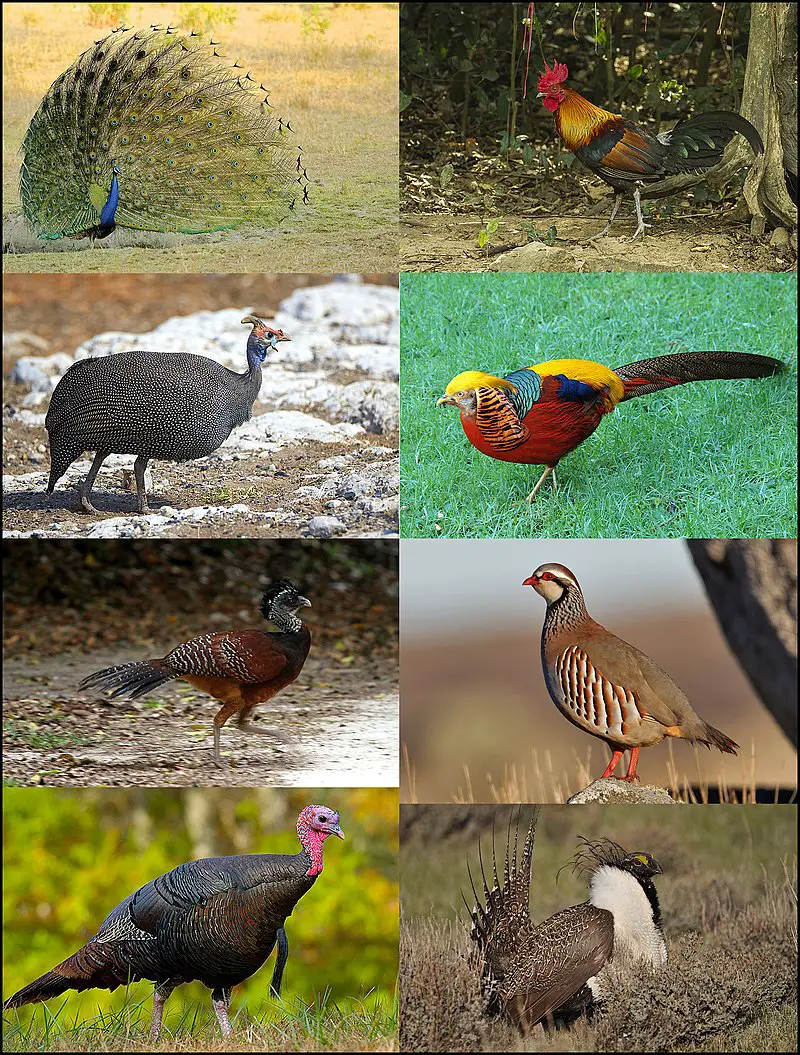
Landfowl birds belong to the Galliformes order, which includes turkeys, chickens, quail, and other ground-feeding species. These birds are essential in their environments as seed dispersers and predators.
Humans have found various uses for them such as raising them for meat or egg production or hunting them down for sports purposes. Landfowl inhabit almost all continents worldwide except Antarctica.
With around 290 different species of landfowl recorded so far, they come in a variety of shapes and sizes ranging from small quails to large gamebirds like turkey vultures.
Their diet consists mainly of plant seeds but they also supplement it with bugs and worms depending on availability within their habitat range.
To protect these beneficial creatures people should take care not to overhunt or destroy their living habitats as this can result in drastic population declines that may ultimately lead to extinction if no action is taken soon enough.
Scientific classification:
| Kingdom | Animalia |
| Phylum | Chordata |
| Class | Aves |
| Clade | Pangalliformes |
| Order | Galliformes Temminck, 1820 |
Also Featured In: Most Common Birds in China, Flocks Birds around Us
2. Indian Peafowl
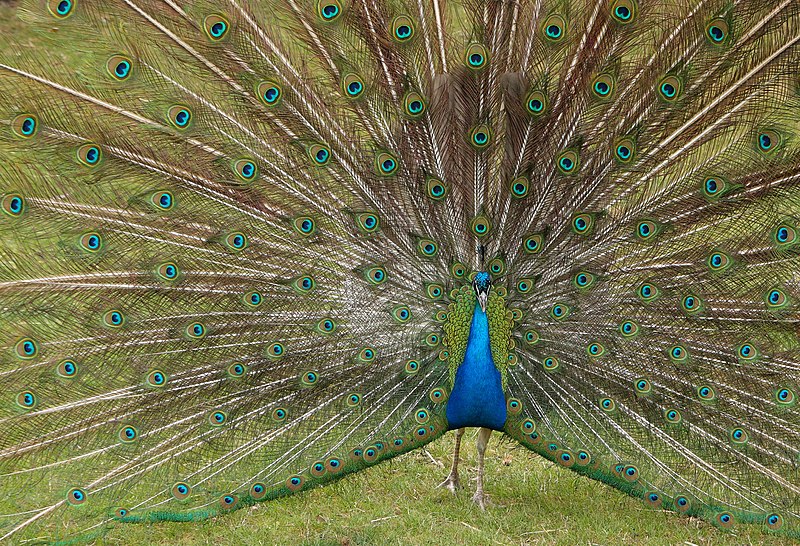
The Indian Peafowl, also known as the common peafowl or blue peafowl, is a species native to the Indian subcontinent. It has since been introduced to many other countries around the world.
Males are referred to as peacocks and females are called peahens, although both sexes can be colloquially referred to simply as “peacock”.
These birds have an impressive display of sex-specific differences in colouration; males show off their iridescent feathers in shades of green and blues while female plumage tends towards more muted browns with red accents on their tail feathers.
The mating dance performed by male Peacocks serves not only for courtship but also acts as a form of territorial advertisement between rival males over available resources such as food sources.
This colourful bird lives up its name with its beautiful displays that captivate viewers from all walks of life.
Scientific classification:
| Kingdom | Animalia |
| Phylum | Chordata |
| Class | Aves |
| Order | Galliformes |
| Family | Phasianidae |
| Genus | Pavo |
| Species | P. cristatus |
Also Featured In: Common Birds in India, Blue Birds You’ll Found around Us
3. Rose-Ringed Parakeet
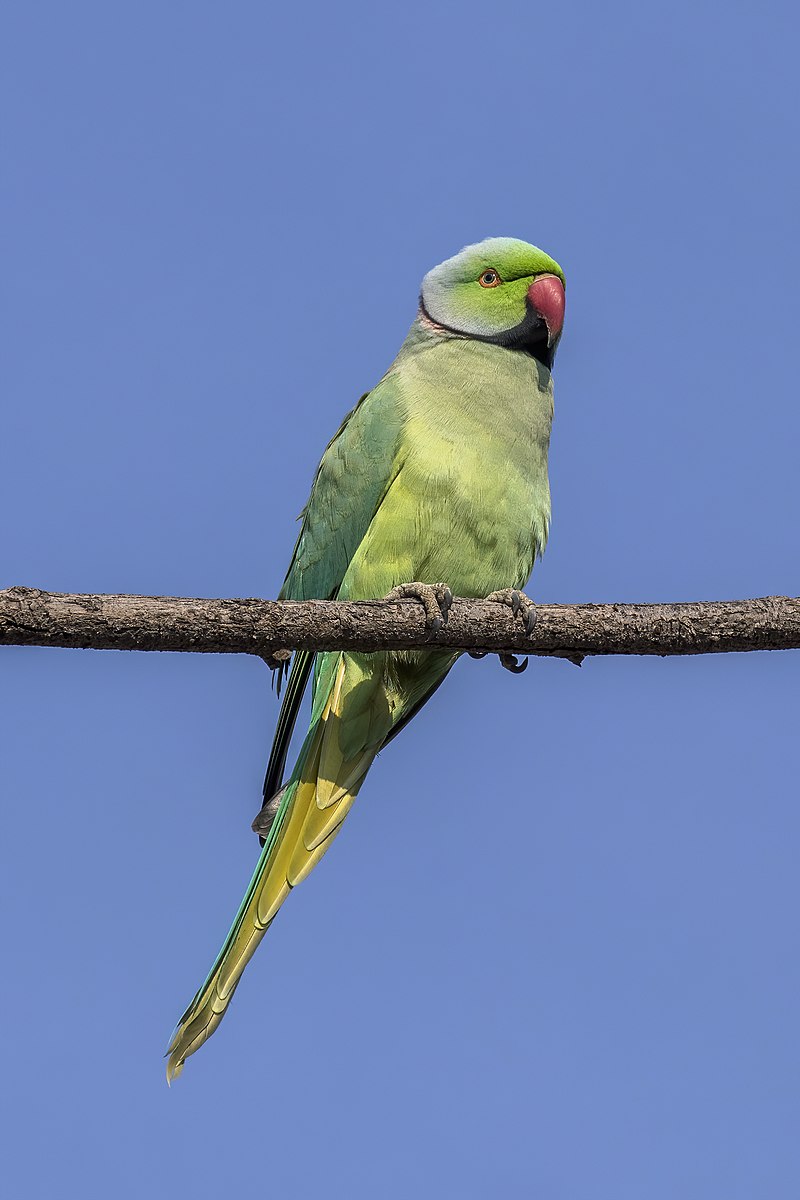
The Rose-ringed parakeet is a medium sized bird in the family Psittacidae. Native to Africa and India, it has been introduced into many other parts of the world where feral populations have now established themselves.
The most distinctive feature of this species is its colorful neck ring ranging from pink to purple which gives them their name.
However, males often display more vibrant colors than females do. This beautiful bird can also imitate human speech quite well making them popular pets worldwide.
In addition they are very social creatures preferring large flocks when out in nature or as part of aviaries during captivity. With proper care these birds can live up to 30 years.
Scientific classification:
| Kingdom | Animalia |
| Phylum | Chordata |
| Class | Aves |
| Order | Psittaciformes |
| Family | Psittaculidae |
| Genus | Psittacula |
| Species | P. krameri |
Also Featured In: Common Birds in the Cities, Common Birds in London
4. Bulbul
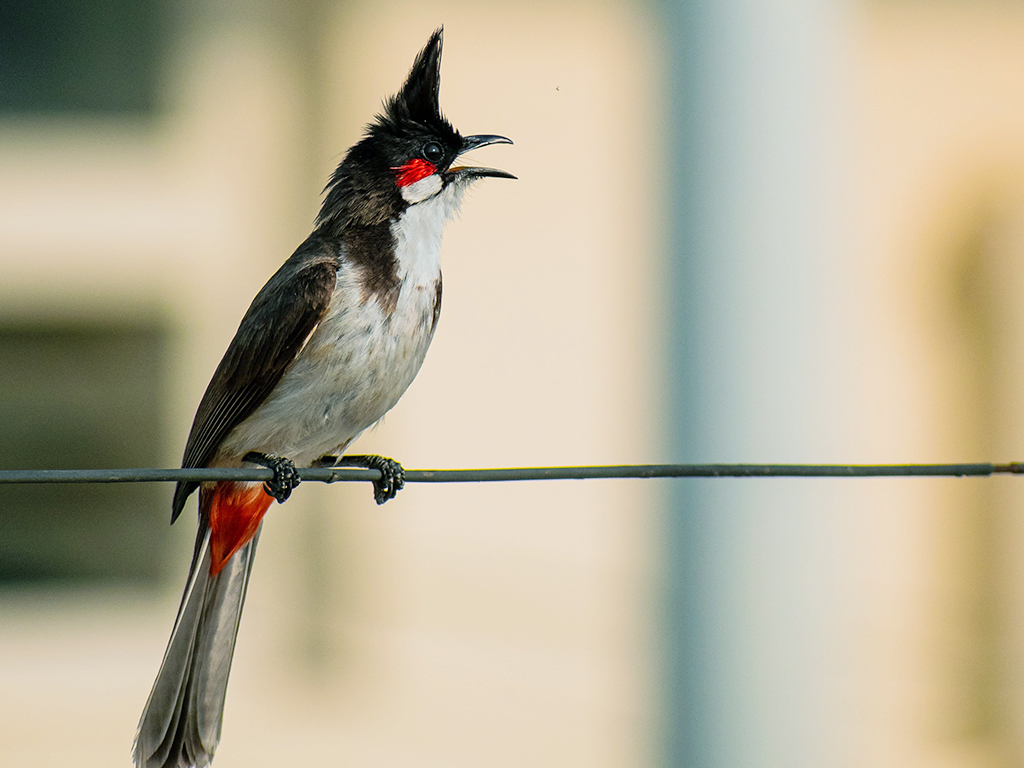
Bulbuls are a medium-sized passerine songbird family native to Africa, the Middle East and tropical Asia up until Japan. They can also be found on some of the Indian Ocean islands.
There are 160 species within 32 genera in this family which includes greenbuls, brownbuls, leafloves and bristlebills.
Bulbul birds have been known for their beautiful singing voices as well as for being very active during mating season when they gather together to create large flocks where potential mates can show off their skills.
The coloration of bulbuls range from dull greys or browns to vibrant yellows with black markings around the head region making them quite attractive creatures indeed.
Scientific classification:
| Kingdom | Animalia |
| Phylum | Chordata |
| Class | Aves |
| Order | Passeriformes |
| Parvorder | Sylviida |
| Family | Pycnonotidae Gray, GR, 1840 |
Also Featured In: Birds That Live in Iraq, Common Uzbekistan Birds
5. Spotted Dove
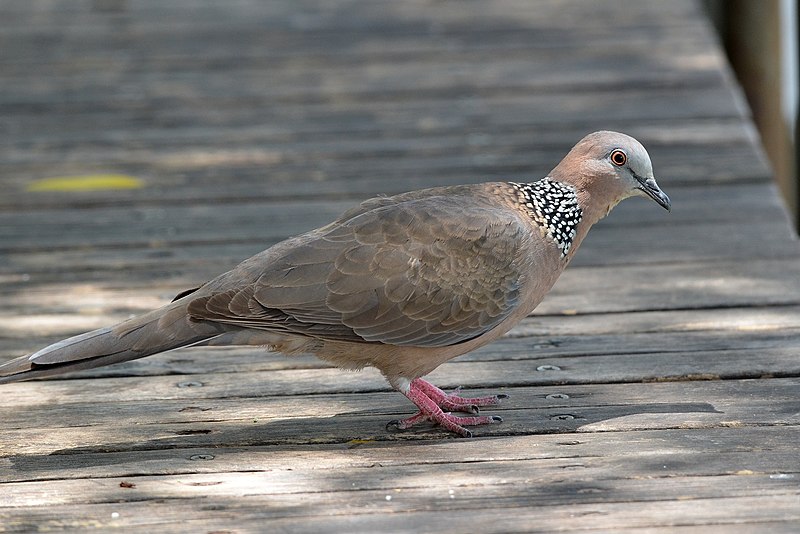
The Spotted Dove is a common species of pigeon found in the Indian subcontinent and Southeast Asia. It has an elegant, slender body with small head, long tail feathers and spotted wings.
Its coloring ranges from grey to brownish-grey on its upperparts with white underparts that are speckled black or dark grey. The male generally has more prominent spots than the female.
They feed mainly on seeds but will also consume insects when available during breeding season as well as berries, grains and fruits throughout their range.
These birds typically live in pairs or small groups near water sources such as ponds, rivers or streams where they can find food easily while staying safe from predators like cats and hawks.
Scientific classification:
| Kingdom | Animalia |
| Phylum | Chordata |
| Class | Aves |
| Order | Columbiformes |
| Family | Columbidae |
| Genus | Spilopelia |
| Species | S. chinensis |
Also Featured In: Hawaii Big Island Birds You Should Know, Hong Kong Birds You Need to See
6. Hyacinth Macaw
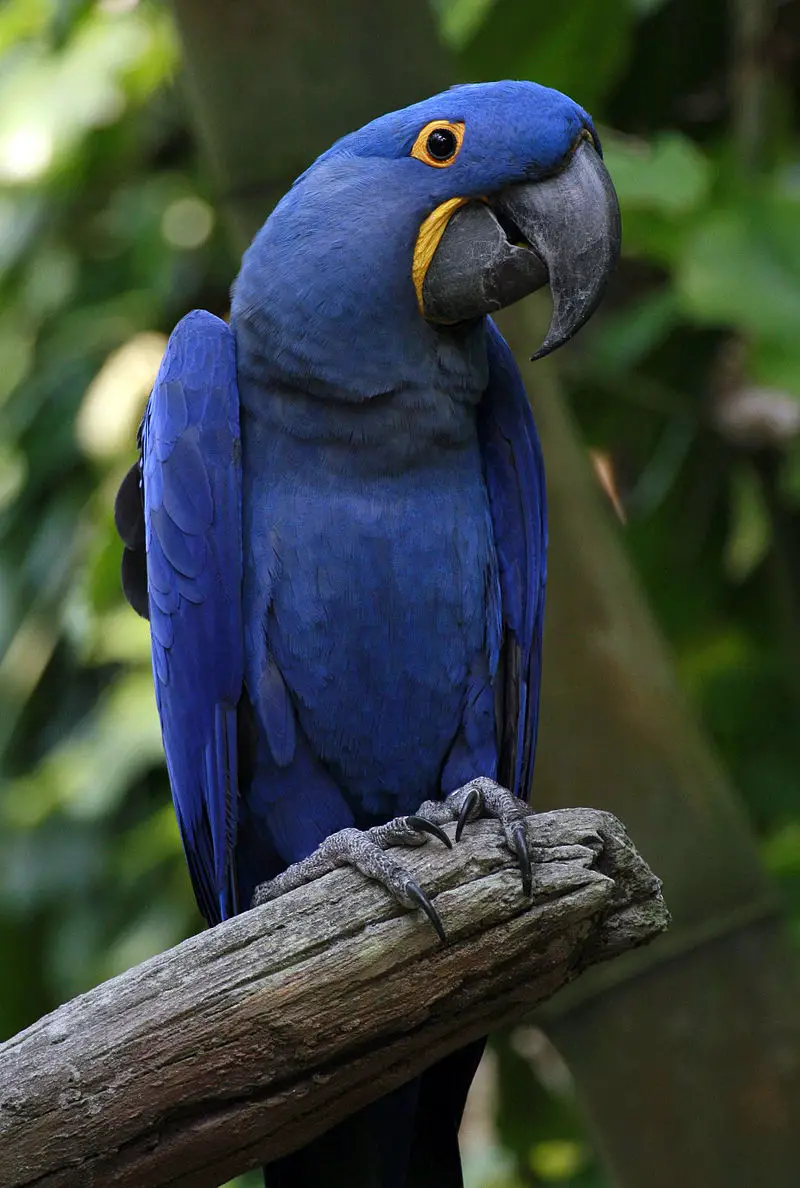
The Hyacinth Macaw is an extraordinary bird, known for its impressive size and vibrant coloration.
It has a length of around one meter, making it the longest parrot species in existence as well as the largest flying parrot species; even larger than 3.5 kg flightless Kākāpō from New Zealand.
Its striking blue plumage with yellow at its wingtips gives this majestic bird an eye-catching appearance that’s sure to turn heads wherever it goes.
Native to central and eastern South America, these birds are highly intelligent creatures who form strong bonds with their owners when kept in captivity.
They make great companions if given proper care and attention which includes providing them with plenty of space for exercise and enrichment activities such as playtime out of the cage on occasion or teaching them tricks using positive reinforcement methods like verbal praise or food rewards.
Scientific classification:
| Kingdom | Animalia |
| Phylum | Chordata |
| Class | Aves |
| Order | Psittaciformes |
| Family | Psittacidae |
| Genus | Anodorhynchus |
| Species | A. hyacinthinus |
Also Featured In: Beautiful Brazilian Birds, Rainforest Birds You Should Know
7. Blue-And-Yellow Macaw
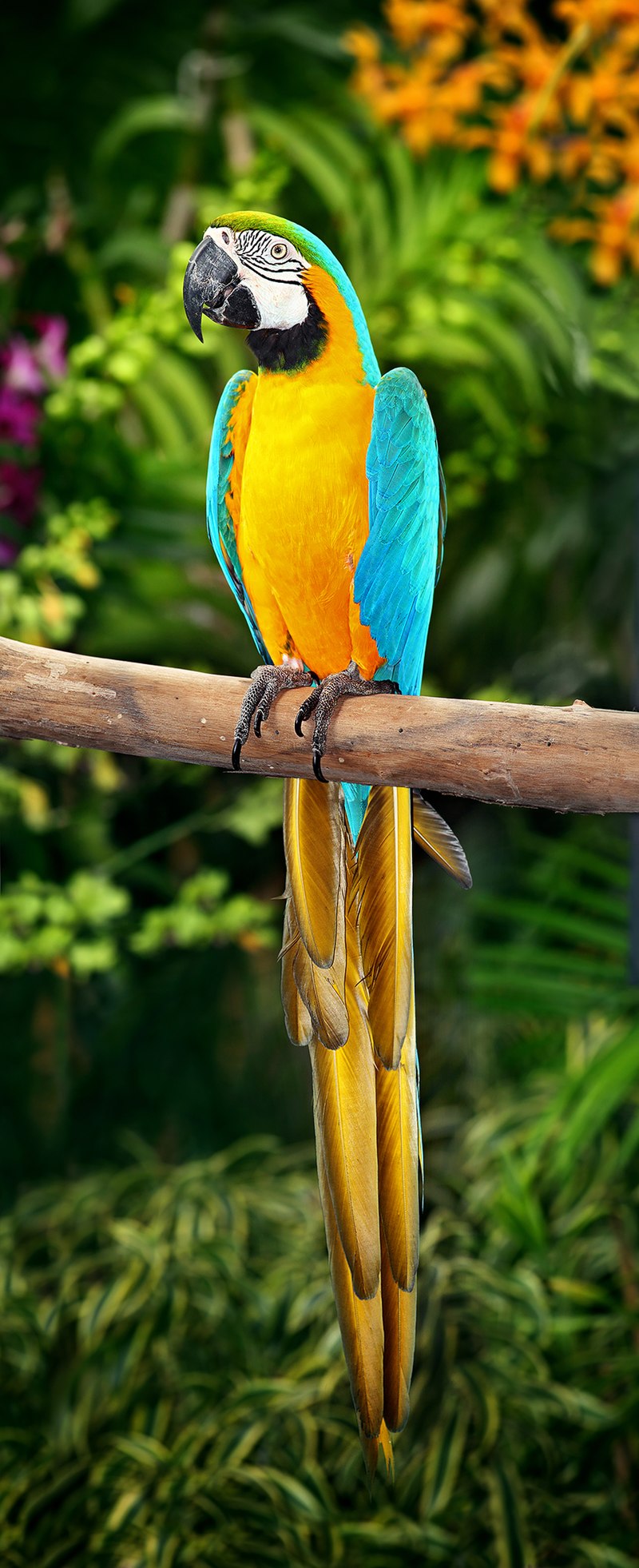
The Blue-and-yellow Macaw is a vibrant and eye catching bird native to South America. It has beautiful blue top parts, light orange underparts, and green on its head.
This large parrot lives in the tropical forests of varzea, terra firme or unflooded forest areas.
They are social birds that live in small flocks which can range from two to twenty birds during breeding season when they look for mates.
They feed mainly on seeds, nuts and fruits but sometimes also eat insects like beetles and caterpillars as well as tender shoots from trees & plants.
These macaws have an impressive call with loud screams used both to attract mates and communicate between members of their flock while flying long distances across open fields together.
Scientific classification:
| Kingdom | Animalia |
| Phylum | Chordata |
| Class | Aves |
| Order | Psittaciformes |
| Family | Psittacidae |
| Genus | Ara |
| Species | A. ararauna |
Also Featured In: Birds You’ll Find in Zoo, Common Tropical Rainforest Birds
8. Common Myna
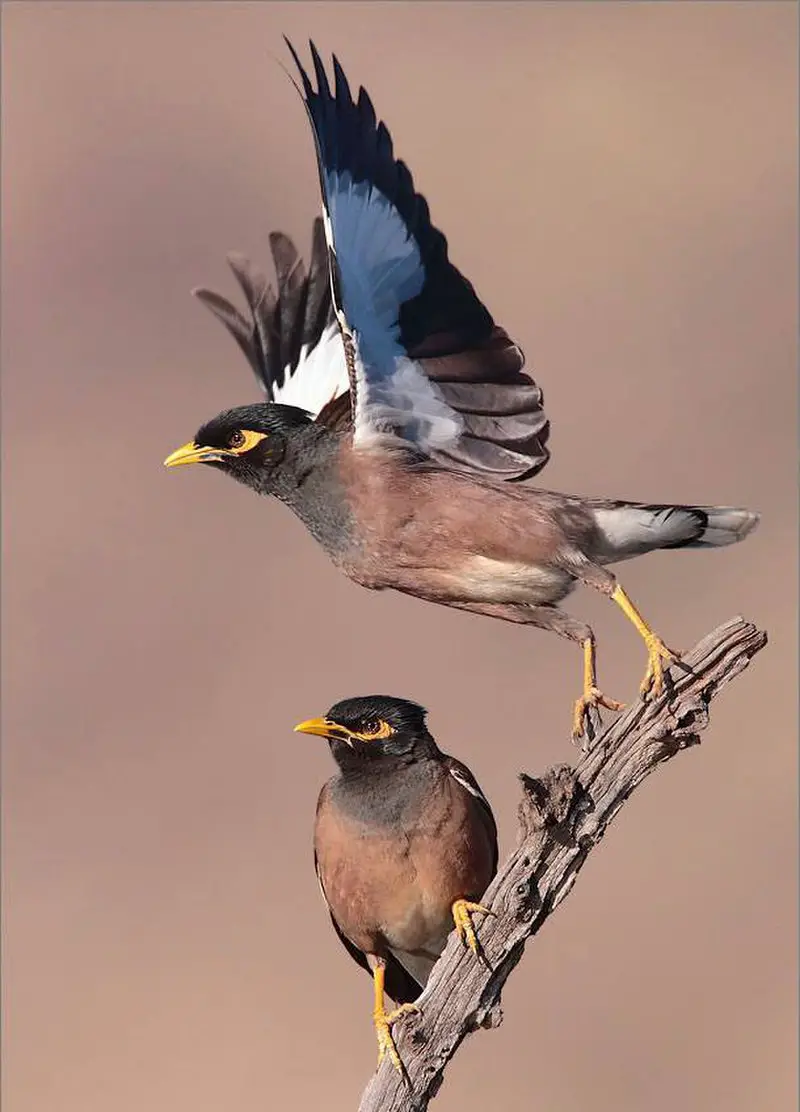
The Common myna is a bird native to Asia and belongs to the Sturnidae family. It has an omnivorous diet, strong territorial instinct and is well adapted to urban environments.
With its range increasing rapidly, it was declared one of the most invasive species by IUCN in 2000. Its distinctive features include black head with a yellow bill, brown body and white tips on wings & tail feathers.
The common myna communicates through loud clicking noises that can easily be heard from long distances in both rural as well as urban areas alike.
They are known for their intelligence; they mimic sounds such as human speech or other birds’ calls making them popular pets among households too.
Scientific classification:
| Kingdom | Animalia |
| Phylum | Chordata |
| Class | Aves |
| Order | Passeriformes |
| Family | Sturnidae |
| Genus | Acridotheres |
| Species | A. tristis |
Also Featured In: Most Common Types of Bangladeshi Birds, Birds of Kauai, Hawaii
9. Vernal Hanging Parrot
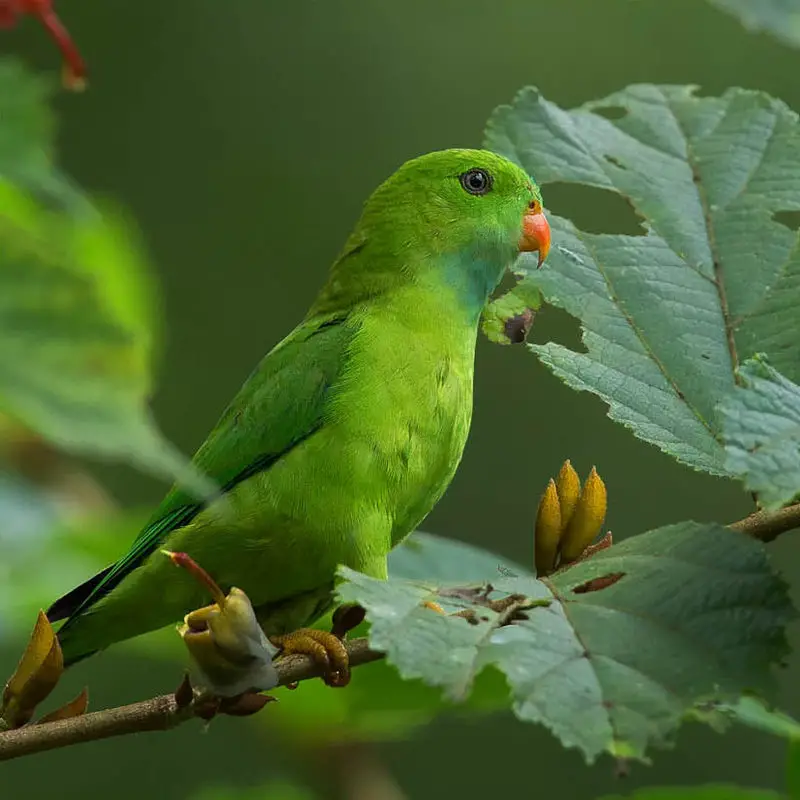
The Vernal hanging parrot is a small, colourful bird native to the Indian subcontinent and parts of Southeast Asia. It has bright green feathers with black edging above its wings and tail, while its chest and belly are yellow-green in colour.
They feed mainly on fruit, seeds, buds and blossoms which they find by frequenting banyan trees for their fruits as well as plantain trees for nectar from flowers.
Although it typically stays within one area throughout the year there have been occasions where this species will move around due to changes in food availability or seasonality.
As such these birds can be found across various habitats including forests, woodlands and urban areas too.
Scientific classification:
| Kingdom | Animalia |
| Phylum | Chordata |
| Class | Aves |
| Order | Psittaciformes |
| Family | Psittaculidae |
| Genus | Loriculus |
| Species | L. vernalis |
Also Featured In: Common Birds that Live in Odisha, Birds of Karnataka
10. Pale-Billed Flowerpecker
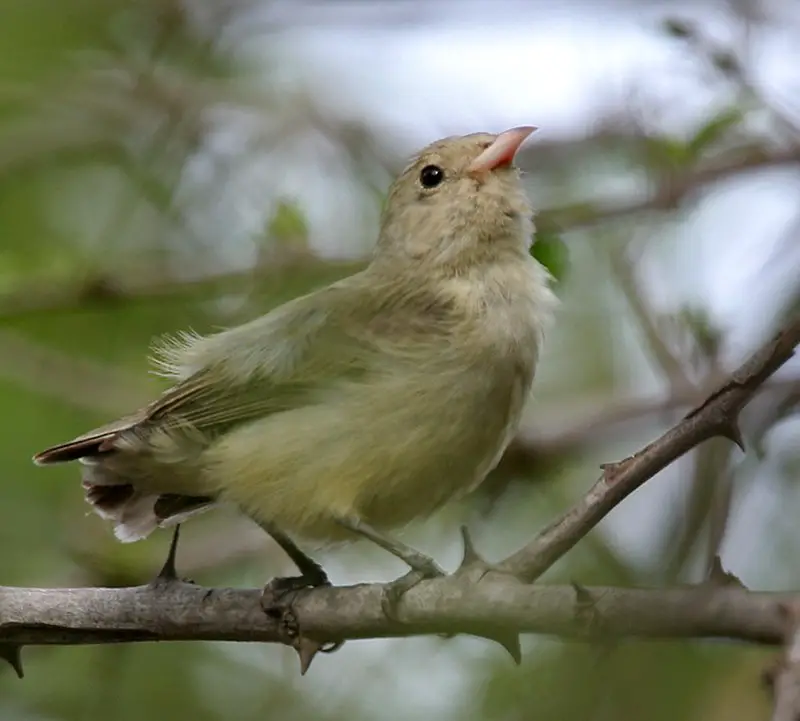
Pale-billed flowerpeckers are small birds with an average length of 8 cm. They have a pinkish curved beak that sets them apart from other similar species in the region.
These little birds can mainly be found throughout India, Sri Lanka, Bangladesh and western Myanmar; they’re especially common in urban gardens where there’s plenty of berry bearing trees for them to feed on.
Not only do they feast on nectar and berries but their loud chipping call is also quite noticeable when spotted around these areas. So next time you spot one out and about make sure to take notice of its unique features.
Scientific classification:
| Kingdom | Animalia |
| Phylum | Chordata |
| Class | Aves |
| Order | Passeriformes |
| Family | Dicaeidae |
| Genus | Dicaeum |
| Species | D. erythrorhynchos |
Also Featured In: Birds that You’ll Find in Kolkata,
11. Black Drongo

The Black Drongo is a small passerine bird of the Dicruridae family, commonly found in tropical southern Asia from Iran through India and Bangladesh to Indonesia.
It has an all black plumage and distinctive forked tail measuring 28 cm long. This omnivorous species feeds on insects such as flies, bees, beetles and moths; it also consumes fruit juices during summer months.
The nest can be built anywhere including open fields or near houses made up of twigs with a cup-shaped inner lining using grasses & hair filled with feathers & cobwebs.
During breeding season they are known to perform aerial acrobatics while chasing away any intruders who come too close to their nests.
Scientific classification:
| Kingdom | Animalia |
| Phylum | Chordata |
| Class | Aves |
| Order | Passeriformes |
| Family | Dicruridae |
| Genus | Dicrurus |
| Species | D. macrocercus |
Also Featured In: Asian Birds, Most Common Taiwan Birds
12. Budgerigar
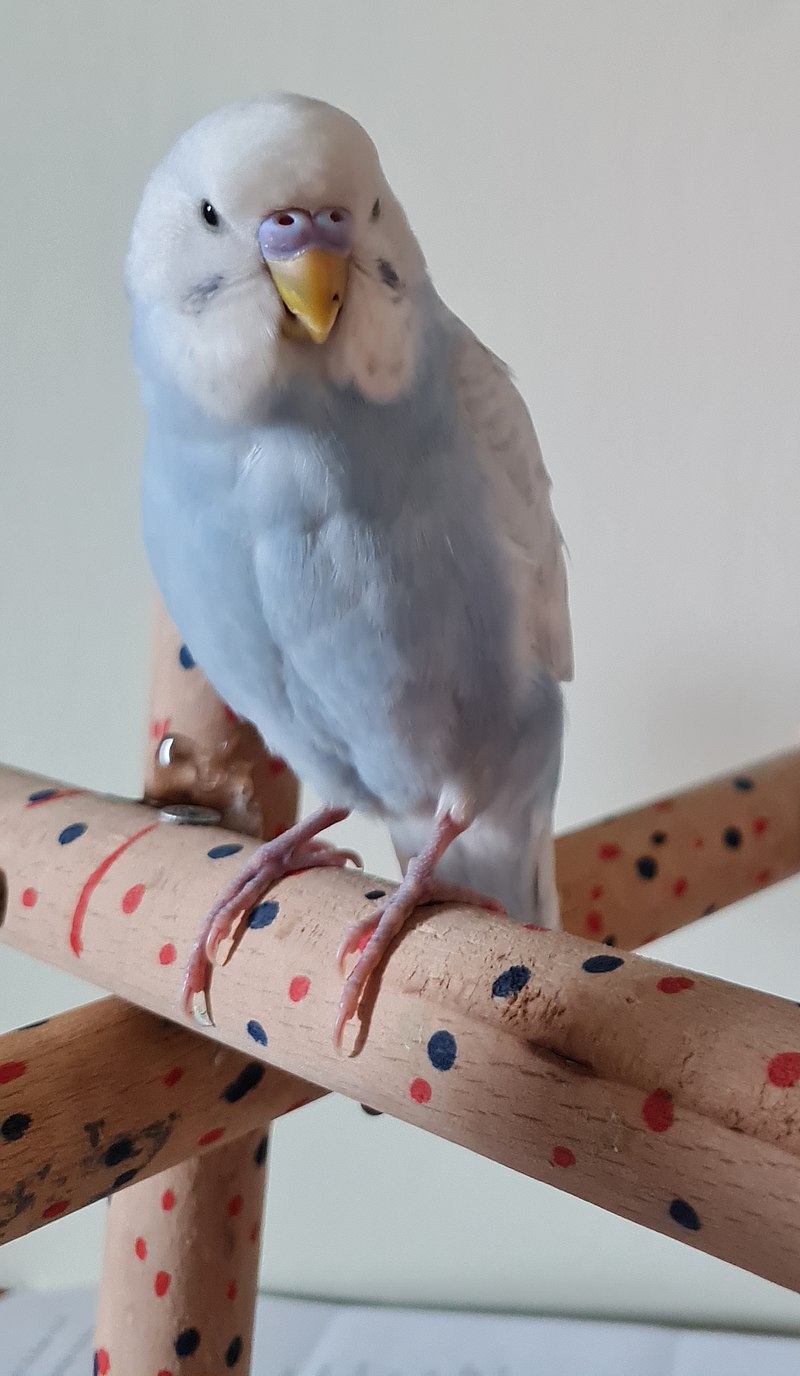
The Budgerigar is a small and beautiful parrot, commonly known as the common parakeet or shell parakeet. It has an average length of 18 cm with a long tail and primarily green-yellow coloration along its body.
Black stripes can be found on their wings and cheeks while they have white rings around their eyes giving them a unique look.
These birds are mainly seed eaters but also love fruits, vegetables, nuts and other grains in captivity.
They are highly social creatures that live in large flocks in the wild but enjoy companionship when kept as pets too.
Their ability to mimic human speech makes them great conversation partners for those living alone who need some company.
Scientific classification:
| Kingdom | Animalia |
| Phylum | Chordata |
| Class | Aves |
| Order | Psittaciformes |
| Family | Psittaculidae |
| Subfamily | Loriinae |
| Tribe | Melopsittacini |
| Genus | Melopsittacus Gould, 1840 |
| Species | M. undulatus |
Also Featured In: Most common birds in Australia, Small Birds that Live in New South Wales
13. Cockatiel
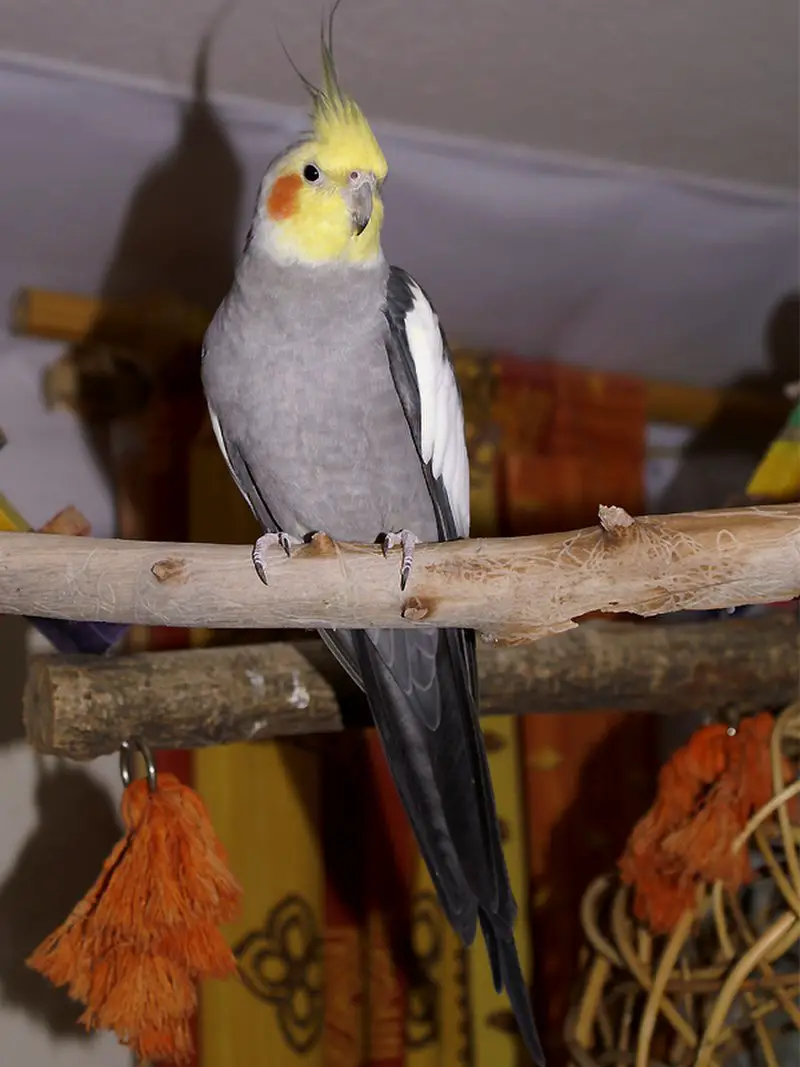
Cockatiels are a medium-sized parrot that is native to Australia and make popular pets around the world.
They have an endearing personality, making them ideal companions for bird owners of all ages.
Cockatiels can be taught tricks, they love interacting with people, and many enjoy being handled as well.
These birds also have beautiful plumage in shades of yellow, white and grey which makes them even more desirable as pet birds.
Their diet should include fresh fruits & veggies along with high-quality seeds or pellets specially formulated for cockatiel’s needs.
With proper care these clever little parrots can live up to 15 years so it’s important to provide them with lots of love and attention.
Scientific classification:
| Kingdom | Animalia |
| Phylum | Chordata |
| Class | Aves |
| Order | Psittaciformes |
| Family | Cacatuidae |
| Subfamily | Nymphicinae |
| Genus | Nymphicus Wagler, 1832 |
| Species | N. hollandicus |
Also Featured In: Birds that Live around Victoria,
14. Orange-Breasted Green Pigeon
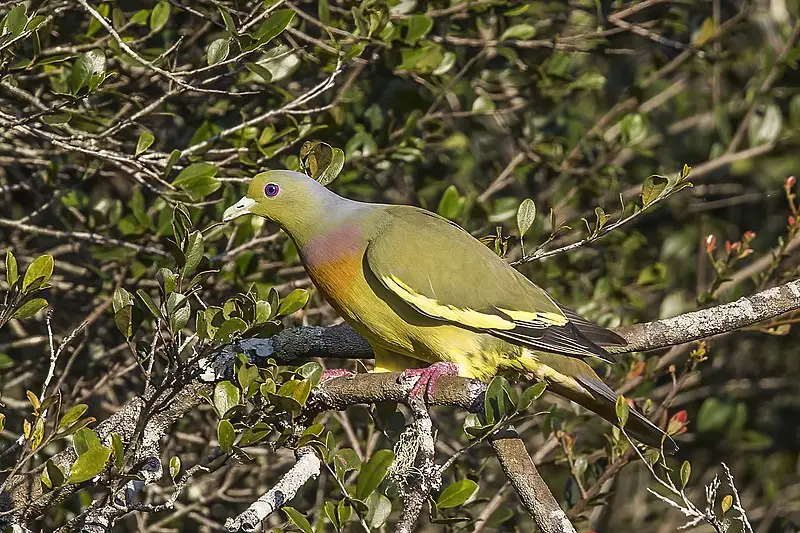
The Orange-breasted green pigeon is a small bird found across tropical Asia, mainly in the Indian Subcontinent and Southeast Asia.
Generally seen in pairs or small flocks, these birds are known for their quiet demeanor while foraging on trees.
They have blue-grey napes with yellowish green crowns, orange breast feathers along with grey wings and tails.
These pigeons predominantly feed on ripe fruits but also consume nuts and seeds to supplement their diet occasionally.
Due to habitat destruction caused by human activities such as logging of forests, this species has been classified as Near Threatened according to IUCN Red List Criteria from 2006 onwards.
Scientific classification:
| Kingdom | Animalia |
| Phylum | Chordata |
| Class | Aves |
| Order | Columbiformes |
| Family | Columbidae |
| Genus | Treron |
| Species | T. bicinctus |
Also Featured In: Birds in Sri Lanka,
15. Green Imperial Pigeon
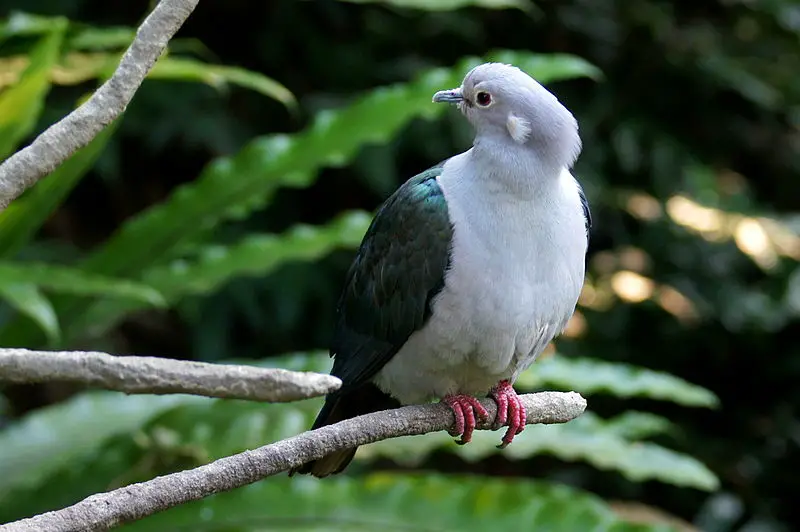
The Green Imperial Pigeon is a majestic bird found in the forests of Nepal, Southern India and Sri Lanka eastwards to southern China, Indonesia and the Philippines.
Measuring at around 37–44 cm long with an average wingspan of 63-71cm, this beautiful creature has deep green plumage on its body along with white patches underneath both wings which make it easily distinguishable from other birds.
In 1760 Mathurin Jacques Brisson described this species as “Le pigeon ramier des Moluques” or “P”. It feeds mainly on fruits like those from fig trees but also eats buds, flowers and arthropods when available.
The Green Imperial Pigeon builds nests mostly high up in tree hollows for protection against predators.
These pigeons are pretty shy animals so it’s important that we do our best not to disturb them while trying to observe their beauty.
Scientific classification:
| Kingdom | Animalia |
| Phylum | Chordata |
| Class | Aves |
| Order | Columbiformes |
| Family | Columbidae |
| Genus | Ducula |
| Species | D. aenea |
Also Featured In: Imperial Birds You Should Know, Most Common Tripura Birds You Need to Know
16. Common Emerald Dove
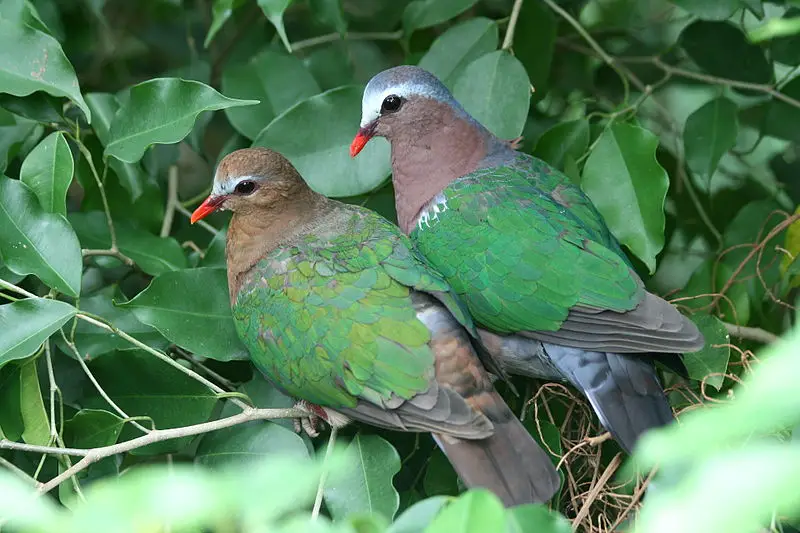
The Common Emerald Dove is a beautiful bird that can be found in tropical and subtropical parts of the Indian Subcontinent and Southeast Asia.
Its distinctive features include its grey-capped head, while its wings are an emerald green colour.
It has also earned itself the nickname “green dove” or “green-winged pigeon”. This species plays an important role in Tamil Nadu’s ecology, which makes it fitting for them to have named it their state bird.
The Pacifric Emerald Dove is closely related to this species but they differ slightly in appearance and habitat preferences; however both make great pets due to being gentle by nature.
Scientific classification:
| Kingdom | Animalia |
| Phylum | Chordata |
| Class | Aves |
| Order | Columbiformes |
| Family | Columbidae |
| Genus | Chalcophaps |
| Species | C. indica |
Also Featured In: Birds that Live in Tamil Nadu, Coastal Birds That Live around Miyako-jima
17. Ashy Drongo
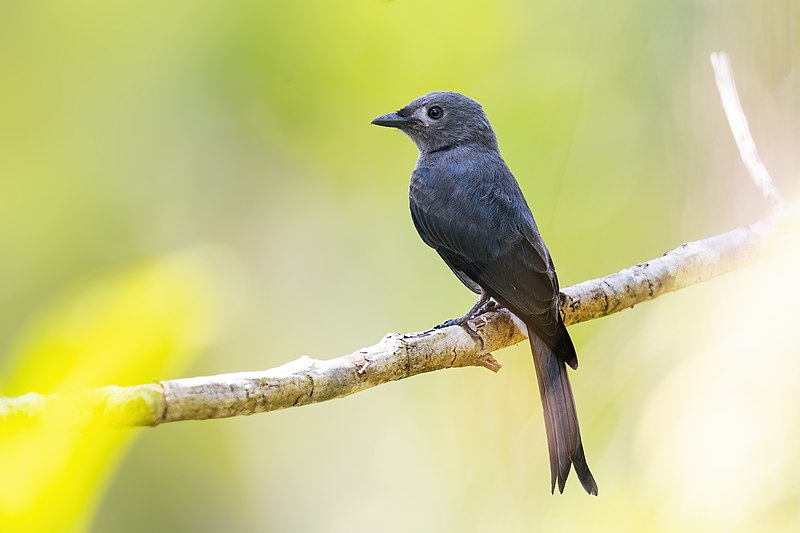
The Ashy Drongo is a species of bird belonging to the drongo family Dicruridae. It has a mainly dark grey plumage and an impressively long, deeply forked tail.
Its distribution across South and Southeast Asia is varied with populations that differ in their shade of grey as well as migration patterns, size or presence of white patches around the eyes.
This medium-sized passerine measures up to 25 cm lengthwise and weighs around 40 gm on average but can reach up to 70 gm at times.
These birds are known for their aerial acrobatics while hunting insects mid-air which makes them quite popular among birders who come from far off places just to catch glimpses of these beautiful creatures in flight.
Scientific classification:
| Kingdom | Animalia |
| Phylum | Chordata |
| Class | Aves |
| Order | Passeriformes |
| Family | Dicruridae |
| Genus | Dicrurus |
| Species | D. leucophaeus |
Also Featured In: Brunei Darussalam Birds, Birds that Live in Borneo Island
18. Jungle Myna
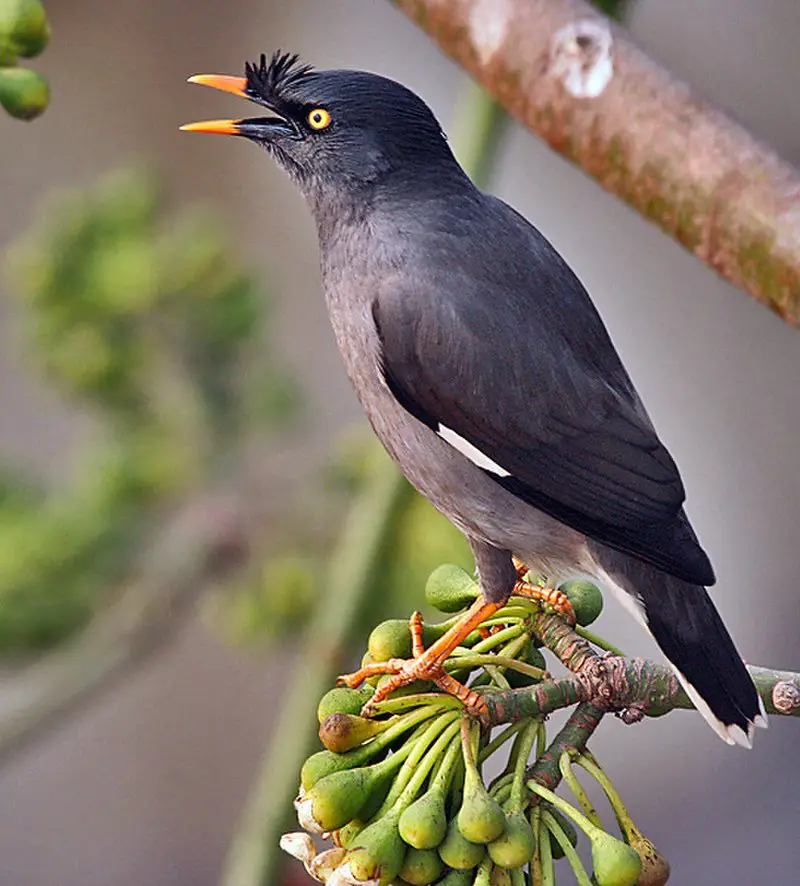
The Jungle myna is an intelligent bird belonging to the starling family. It has a distinct tuft of feathers on its forehead and forms a frontal crest, which makes it easily recognizable.
Its range encompasses much of the mainland Indian Subcontinent but not in arid zones like India.
They are known for their intelligence and ability to mimic human speech, making them popular among pet owners as well as wildlife enthusiasts.
Furthermore, they have also been observed cooperating with other species when searching for food or nesting materials.
The Jungle Myna is often seen near water bodies where it forages for insects such as grasshoppers that make up its most important source of nutrition .
Thus due to these reasons , this beautiful creature should be protected from any harm.
Scientific classification:
| Kingdom | Animalia |
| Phylum | Chordata |
| Class | Aves |
| Order | Passeriformes |
| Family | Sturnidae |
| Genus | Acridotheres |
| Species | A. fuscus |
Also Featured In: Cook Islands birds, Birds That Live in the Jungle
19. Sun Conure
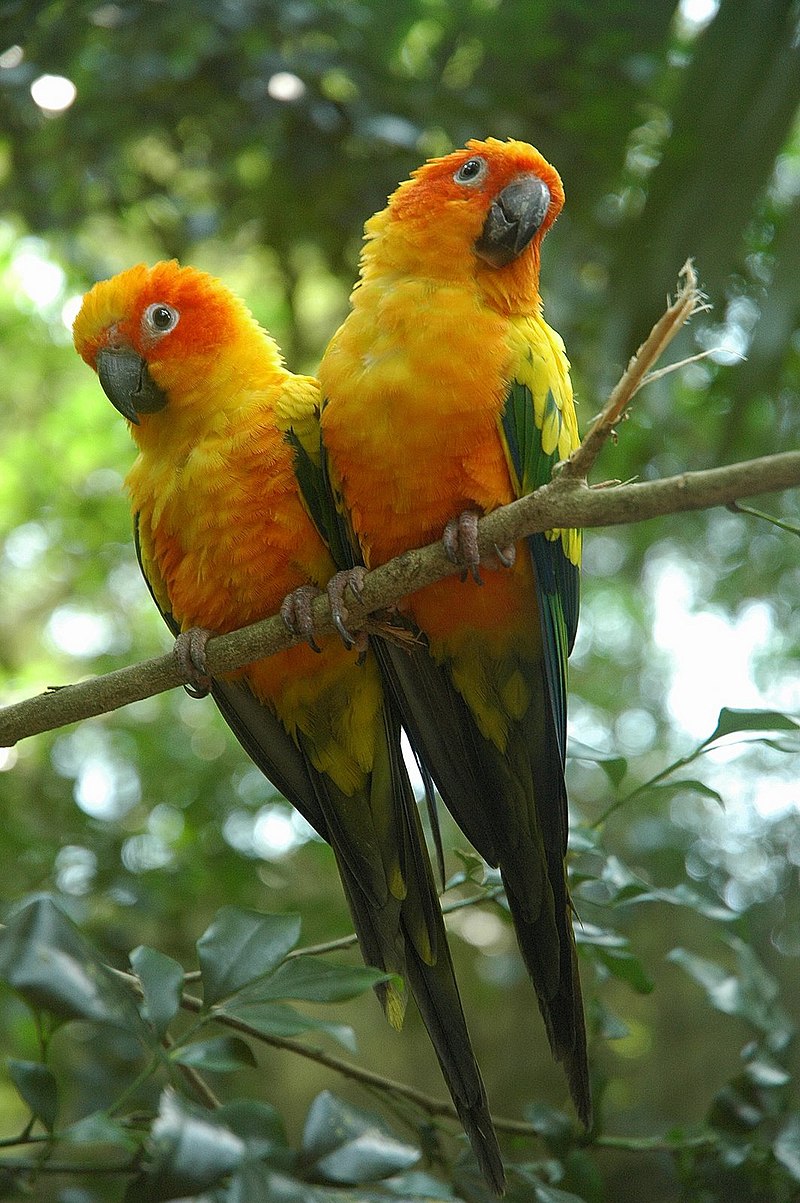
The Sun Conure is a vibrant and social species of parrot native to northeastern South America. Both males and females have predominantly golden-yellow plumage, with orange flushes under the face and wings tipped in green and blue.
They are medium sized birds with black beaks that can make for great companions when properly cared for.
These birds love attention from their owners, so it’s important to spend quality time interacting with them on a regular basis to ensure they remain happy and healthy.
As conures go, the Sun Conure stands out due its bright colours which makes them popular among bird lovers around the world.
Scientific classification:
| Kingdom | Animalia |
| Phylum | Chordata |
| Class | Aves |
| Order | Psittaciformes |
| Family | Psittacidae |
| Genus | Aratinga |
| Species | A. solstitialis |
Also Featured In: Parrots Species, Aviary Birds You Should Know
20. Red-Shouldered Macaw
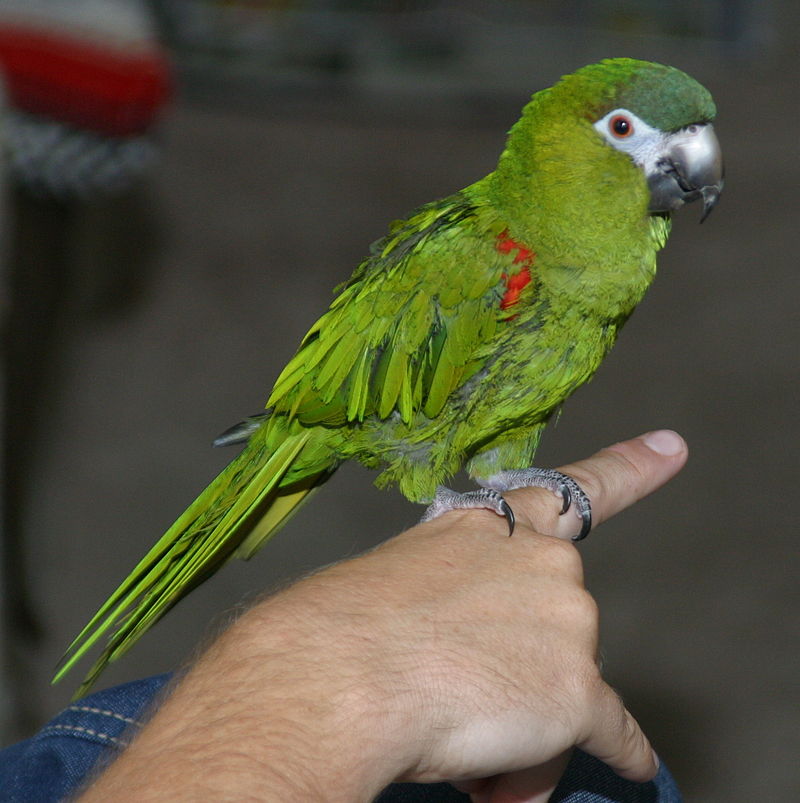
The Red-shouldered Macaw is a small South American parrot, belonging to the macaw family. Named after its bright red coverts on its wings, it measures 12 – 14 inches in length and is one of the smallest members of this group.
It can be found living in tropical lowlands, savannahs and swamplands across Brazil and Guyana.
The species has adapted well to human presence around them so they are commonly seen near humans dwelling areas such as farms or settlements where food sources are plentiful for these birds.
They have an omnivorous diet which consists mainly of fruits like palm nuts, seeds from grasses and even insects when available.
With their beautiful green plumage and loud calls echoing through forests they make a great addition to any backyard aviary if given enough space for flying about.
Scientific classification:
| Kingdom | Animalia |
| Phylum | Chordata |
| Class | Aves |
| Order | Psittaciformes |
| Family | Psittacidae |
| Tribe | Arini |
| Genus | Diopsittaca Ridgway, 1912 |
| Species | D. nobilis |
Also Featured In: Case Birds that Live in with Us,
21. Crimson Sunbird
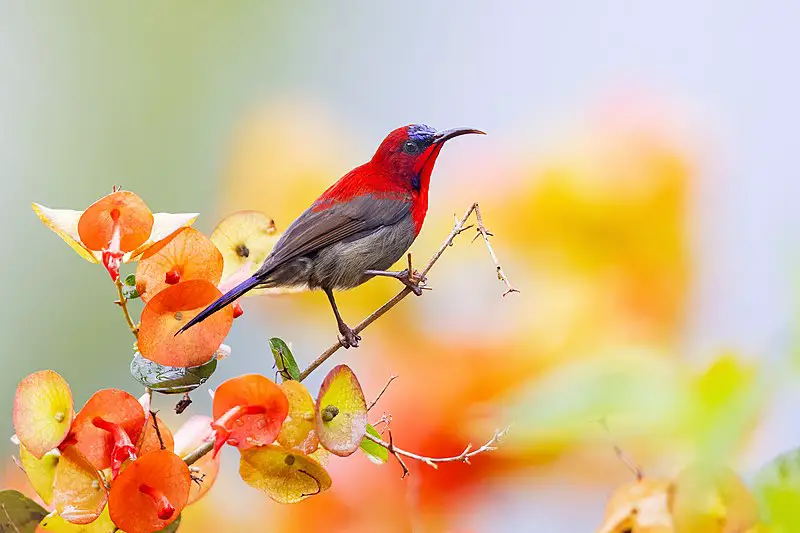
The Crimson sunbird is a species of bird that belongs to the Sunbird family. They have short wings and are known for their fast and direct flight.
These birds primarily feed on nectar but may also take insects, especially when feeding young ones.
Their method of feeding includes hovering like hummingbirds or perching on branches. The Nature Society Singapore has unofficially announced it as the national bird due to its vibrant colours which adds beauty to our nation’s landscape.
It is an important part of nature with its unique characteristics, making them very special in every way possible.
Scientific classification:
| Kingdom | Animalia |
| Phylum | Chordata |
| Class | Aves |
| Order | Passeriformes |
| Family | Nectariniidae |
| Genus | Aethopyga |
| Species | A. siparaja |
Also Featured In: Red Birds, Spiritual Birds
22. Lovebirds
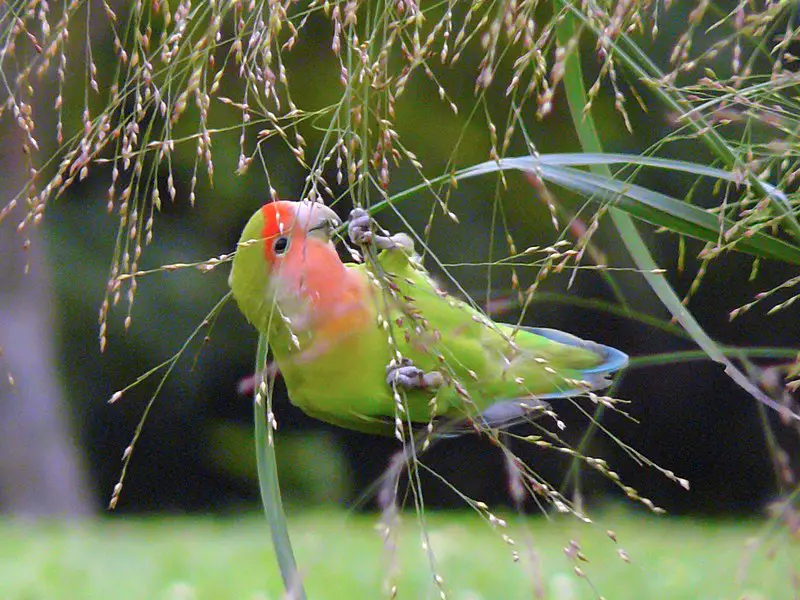
Lovebirds are small, affectionate parrots native to Africa. They form strong bonds with their partner and mate for life, hence the name.
The nine species of lovebird range in size from 12-17 cm long, with most having a bright green plumage and some sporting unique markings on their heads or faces like yellow cheek patches or grey heads.
Lovebirds are social birds that enjoy interacting with each other and human companionship as well. They can be quite vocal too – making chirps, whistles and even screeches when they get excited.
These colourful little birds make wonderful pets if given enough space to roam around safely since they need lots of stimulation from playing toys and activities to stay healthy mentally.
Scientific classification:
| Kingdom | Animalia |
| Phylum | Chordata |
| Class | Aves |
| Order | Psittaciformes |
| Family | Psittaculidae |
| Subfamily | Agapornithinae |
| Genus | Agapornis Selby, 1836 |
Also Featured In: birds of green birds,
23. Columbidae
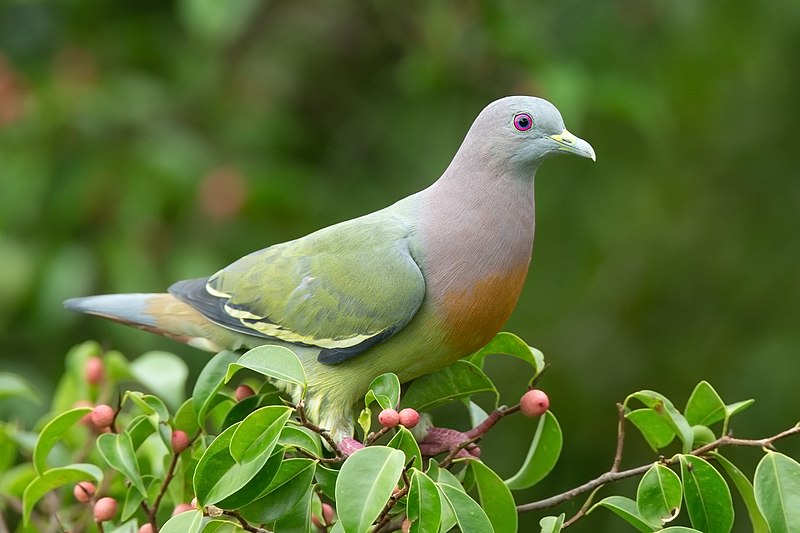
Columbidae is a bird family that includes both doves and pigeons. These birds are characterized by their stout bodies, short necks, and small slender bills with fleshy ceres in some species.
They feed mainly on seeds, fruits, and plants found all around the world but have the greatest variety in Indomalayan and Australasian regions.
Columbidae have an unmistakable soft cooing sound which makes them one of the most beloved avian families worldwide – especially among city dwellers.
Whether it be feeding time or just hearing their soothing call throughout nature walks; these birds will remain a favourite for many more years to come.
Scientific classification:
| Kingdom | Animalia |
| Phylum | Chordata |
| Class | Aves |
| Clade | Columbimorphae |
| Order | Columbiformes Latham, 1790 |
| Family | Columbidae Leach, 1820 |
Also Featured In: birds of white, Birds for Your Home Garden
24. Alexandrine Parakeet
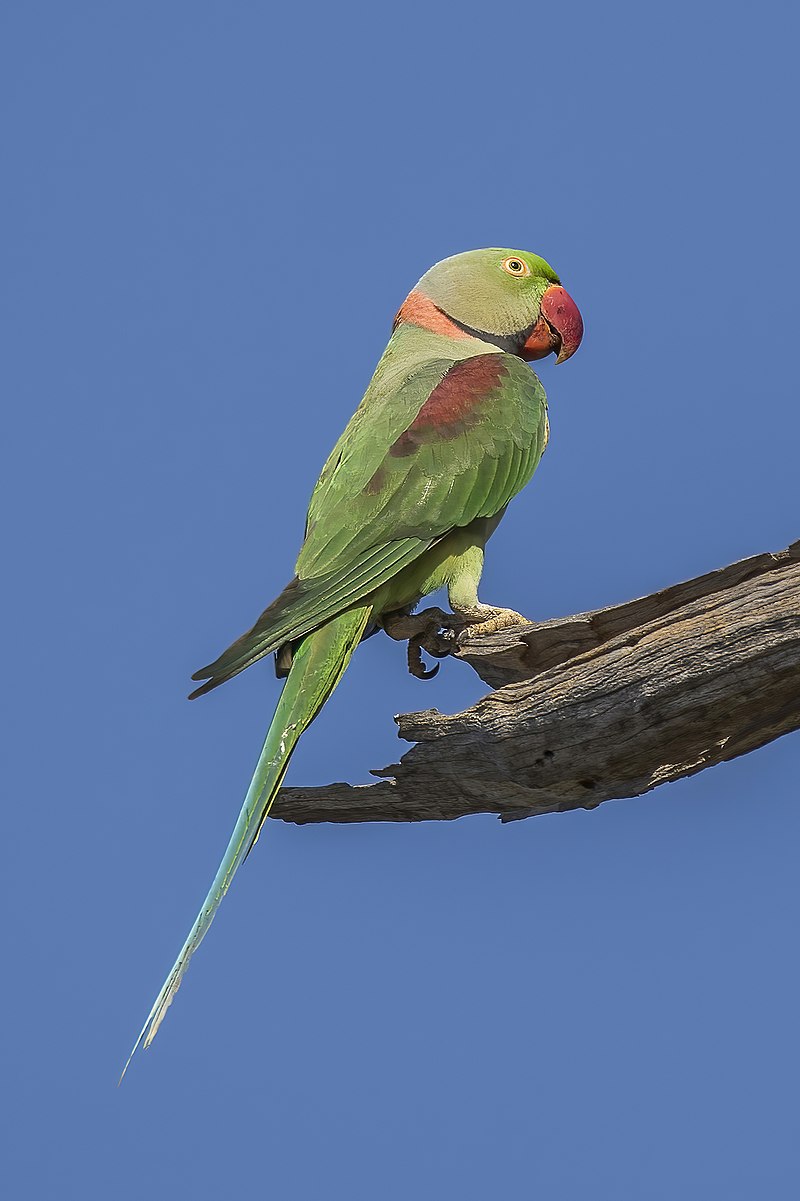
The Alexandrine parakeet is a medium-sized parrot belonging to the Psittacula genus. It is named after Alexander the Great.
Alexander transported many of these parakeets from Punjab to various countries in Europe and the Mediterranean, where they were highly valued by royalty, nobility, and warlords.
They are also known as Alexandrine parrots.
Scientific classification:
| Kingdom | Animalia |
| Phylum | Chordata |
| Class | Aves |
| Order | Psittaciformes |
| Family | Psittaculidae |
| Genus | Psittacula |
| Species | P. eupatria |
Also Featured In: Common Birds of Mumbai, Birds That You’ll See in Kaziranga National Park
25. Plum-Headed Parakeet
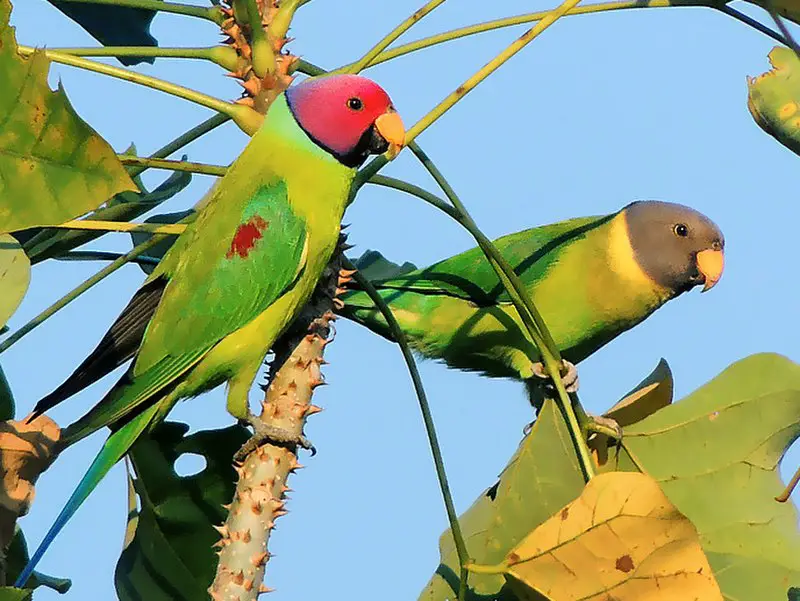
The Plum-headed parakeet is a bird in the Psittacidae family, endemic to the Indian Subcontinent. It was once considered the same species as the blossom-headed parakeet, but has been recognized as a distinct species.
Males have a pinkish-purple head, while females have a grey head. They fly swiftly in flocks, and are known for their vibrant colors.
Their diet typically consists of fruits, flowers and seeds. These birds are popular among bird enthusiasts for their beauty and entertaining personalities.
They are also considered a pest by some farmers, as they can cause damage to crops.
Despite this, the Plum-headed parakeet remains a much-loved bird in the Indian subcontinent, and is considered a symbol of love and romance in some cultures.
Scientific classification:
| Kingdom | Animalia |
| Phylum | Chordata |
| Class | Aves |
| Order | Psittaciformes |
| Family | Psittaculidae |
| Genus | Psittacula |
| Species | P. cyanocephala |
Also Featured In: Birds of Goa, Delhi Birds You Need to See
26. Spangled Drongo
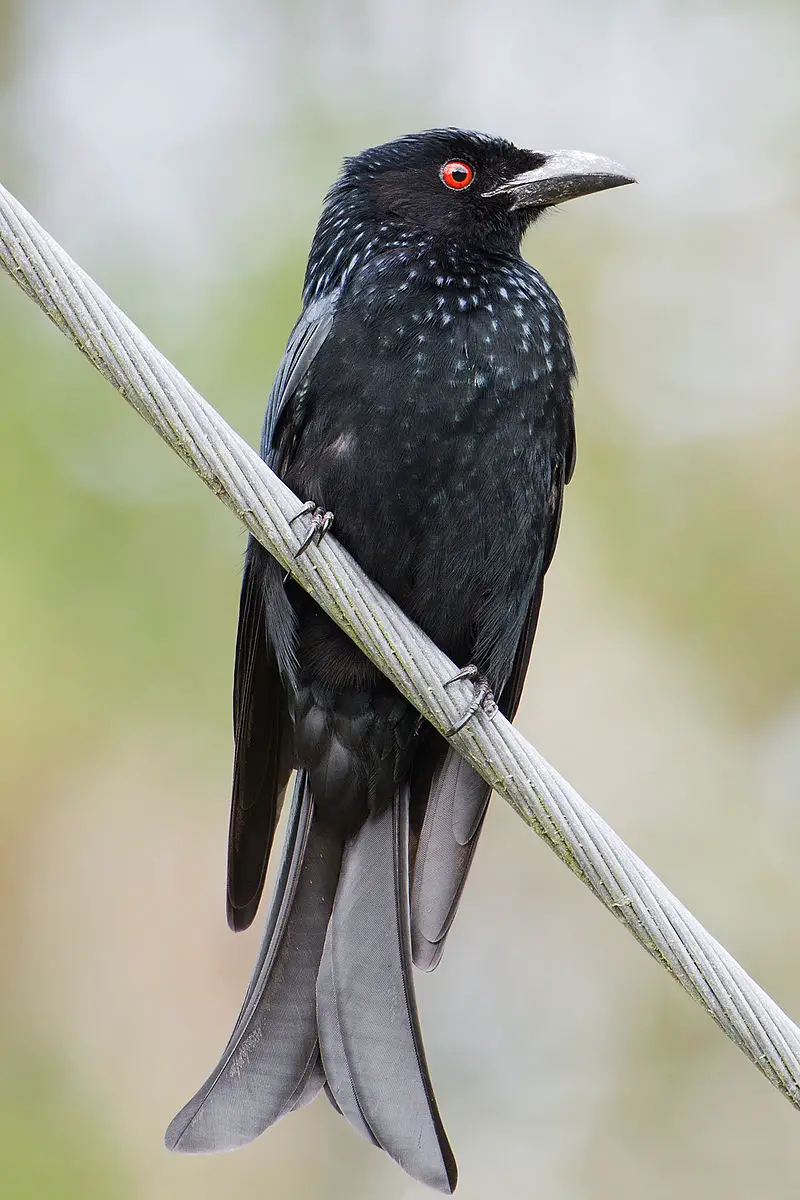
The Spangled drongo is a unique bird found only in Australia. Its black plumage with iridescent shades and forked tail make it easy to identify. It feeds on small animals and insects.
Its call is varied and complex, as it can mimic sounds in its environment. During late spring, it arrives in Queensland to breed in high places.
The Spangled drongo is a fascinating bird for birdwatchers and ornithologists in Australia.
Scientific classification:
| Kingdom | Animalia |
| Phylum | Chordata |
| Class | Aves |
| Order | Passeriformes |
| Family | Dicruridae |
| Genus | Dicrurus |
| Species | D. bracteatus |
Also Featured In: Birds that Live around Brisbane, Birds that Charles Darwin Studied
27. Domestic Canary
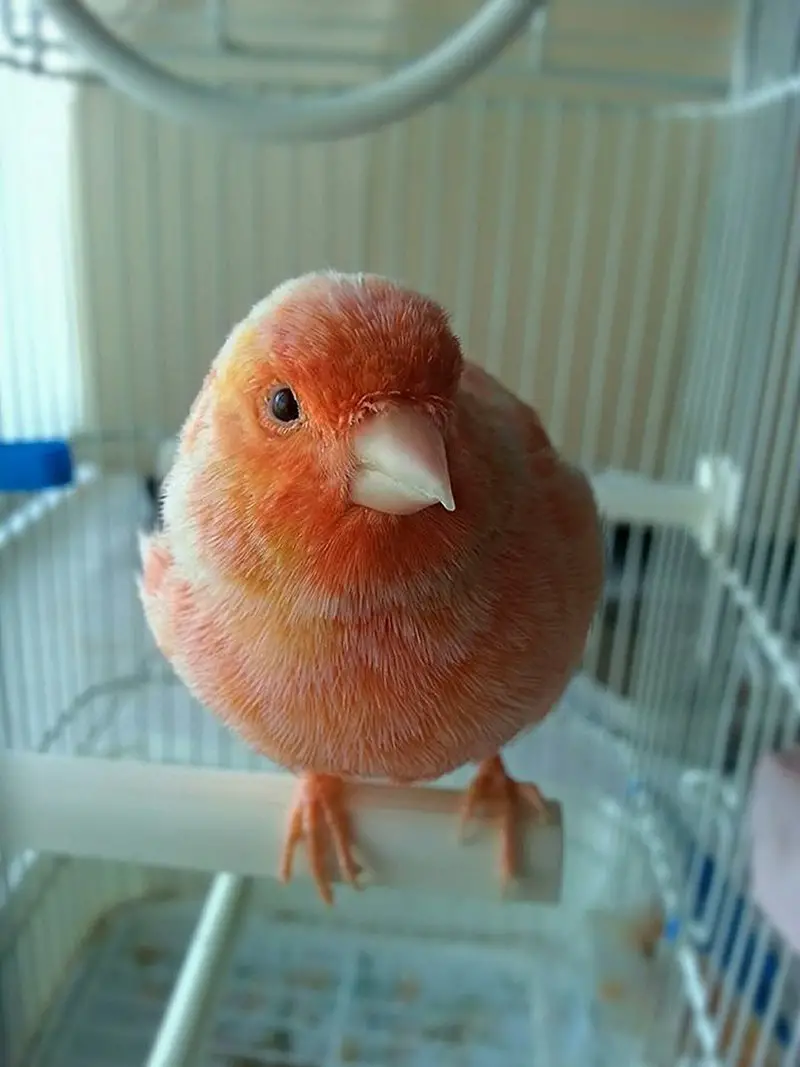
The domestic canary, also referred to as simply the canary, is a small finch originating from the Macaronesian Islands. It is a domesticated form of the wild canary, often kept as a pet due to its beautiful vocal abilities.
These birds were first bred in captivity in the 17th century and were brought to Europe by Spanish sailors.
Canaries are highly valued for their melodious songs and were once considered a luxury pet due to their high cost.
Despite their small size, they have a significant impact on the pet industry and are beloved by many bird enthusiasts worldwide.
Welcome in households as well as aviaries, canaries are a popular and charming addition to any home.
Scientific classification:
| Kingdom | Animalia |
| Phylum | Chordata |
| Class | Aves |
| Order | Passeriformes |
| Family | Fringillidae |
| Subfamily | Carduelinae |
| Genus | Serinus |
| Species | S. canaria |
| Subspecies | S. c. domestica |
Also Featured In: Birds of Symbolism,
28. Greater Racket-Tailed Drongo
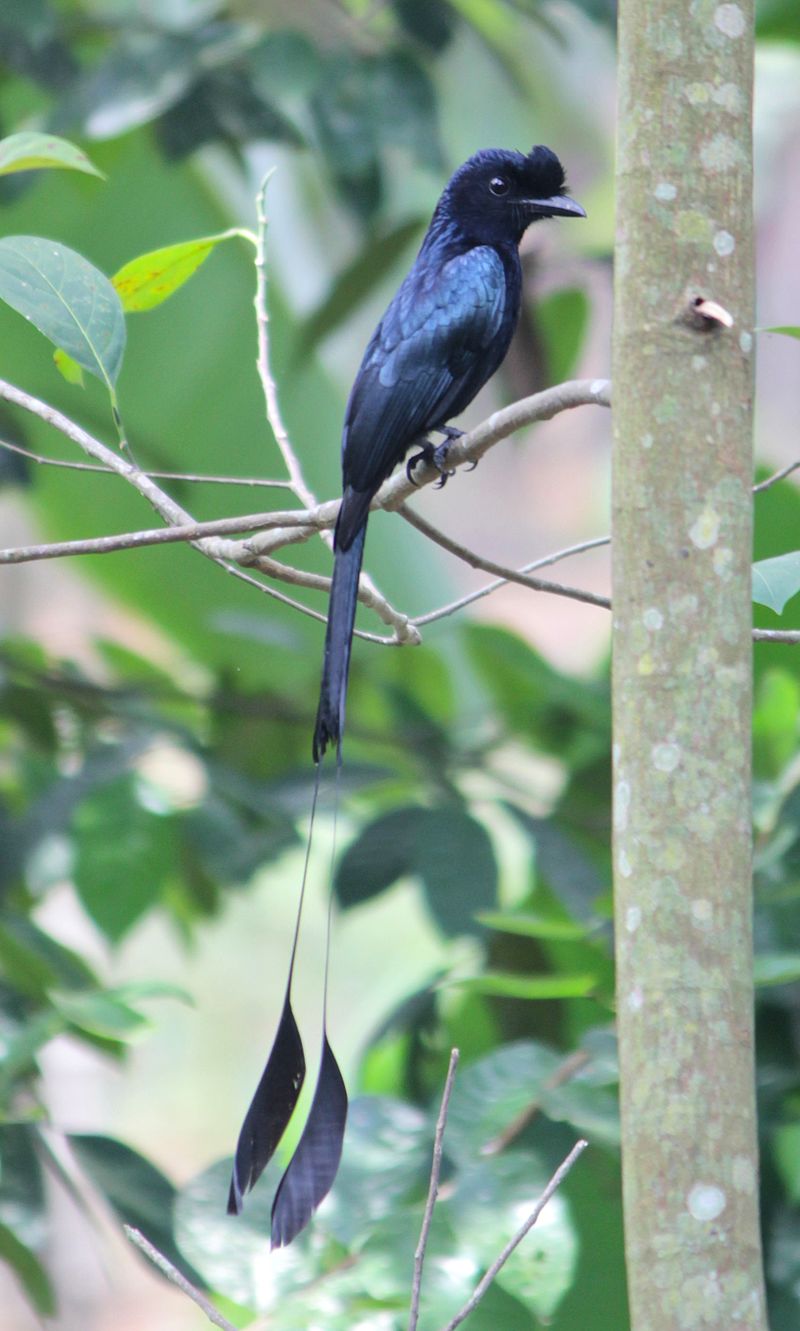
The Greater racket-tailed drongo is a medium-sized bird that inhabits forests in Asia. This bird is easily recognized by its elongated outer tail feathers which have webbing only at the tips.
The Greater racket-tailed drongo is part of the Dicruridae family, which also includes other types of drongos.
They are known for their conspicuous nature, often perching out in the open and using a variety of loud calls that include perfect mimicry of other birds and animals.
They are skilled at attracting attention, and can be seen flashing their long tails to intimidate predators or attract mates.
The Greater racket-tailed drongo is an important member of its ecosystem, helping to control insect populations and acting as a key prey species for predators.
Overall, this bird is a fascinating and important species of the Asian forests it inhabits.
Scientific classification:
| Kingdom | Animalia |
| Phylum | Chordata |
| Class | Aves |
| Order | Passeriformes |
| Family | Dicruridae |
| Genus | Dicrurus |
| Species | D. paradiseus |
Also Featured In: Endemic Sri Lanka Birds, Common Birds of Hainan
29. Blue-Winged Parakeet
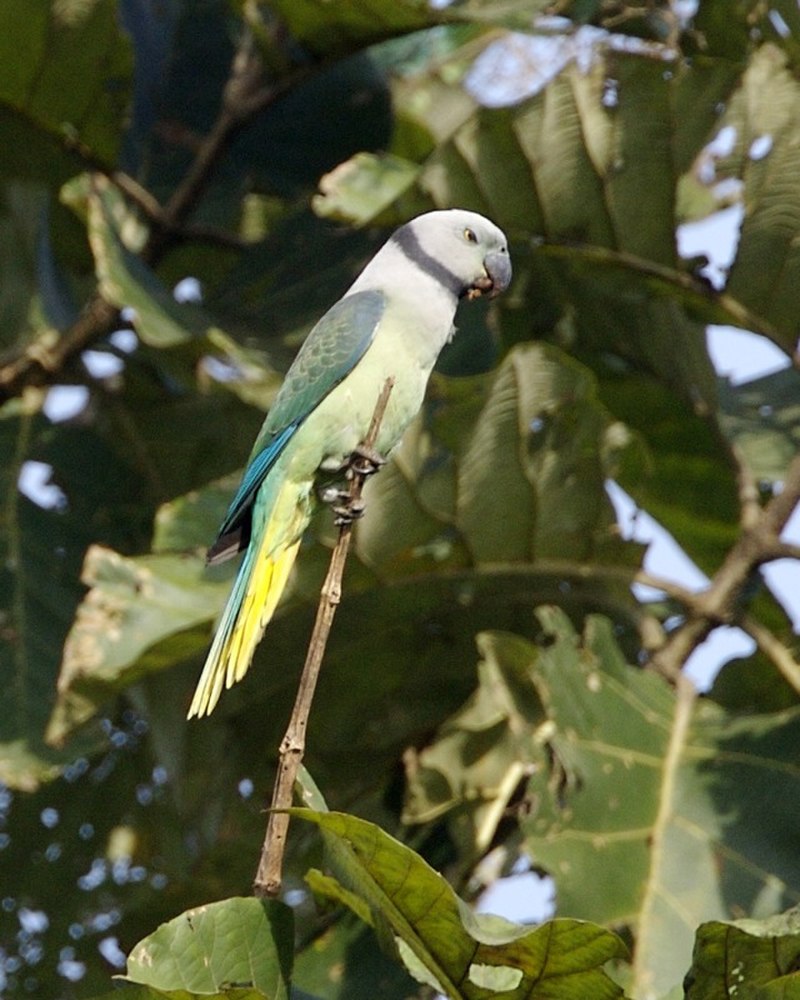
The Blue-winged parakeet, also known as the Malabar parakeet, is a unique species of parakeet that can be found exclusively in the Western Ghats of southern India.
These birds live in small flocks and are easily recognizable by their long blue tails, which are tipped in yellow, and their dark wings with blue color.
They are very agile and fly rapidly in clearings while making screeching calls that differ from other parakeet species in their area.
Despite being a local favorite, these birds are threatened by habitat loss, and their population is declining.
It is important to protect these beautiful and unique parakeets so that future generations can appreciate their beauty and significance.
Scientific classification:
| Kingdom | Animalia |
| Phylum | Chordata |
| Class | Aves |
| Order | Psittaciformes |
| Family | Psittaculidae |
| Genus | Psittacula |
| Species | P. columboides |
Also Featured In: Common Birds in Kerala,
30. Nilgiri Wood Pigeon
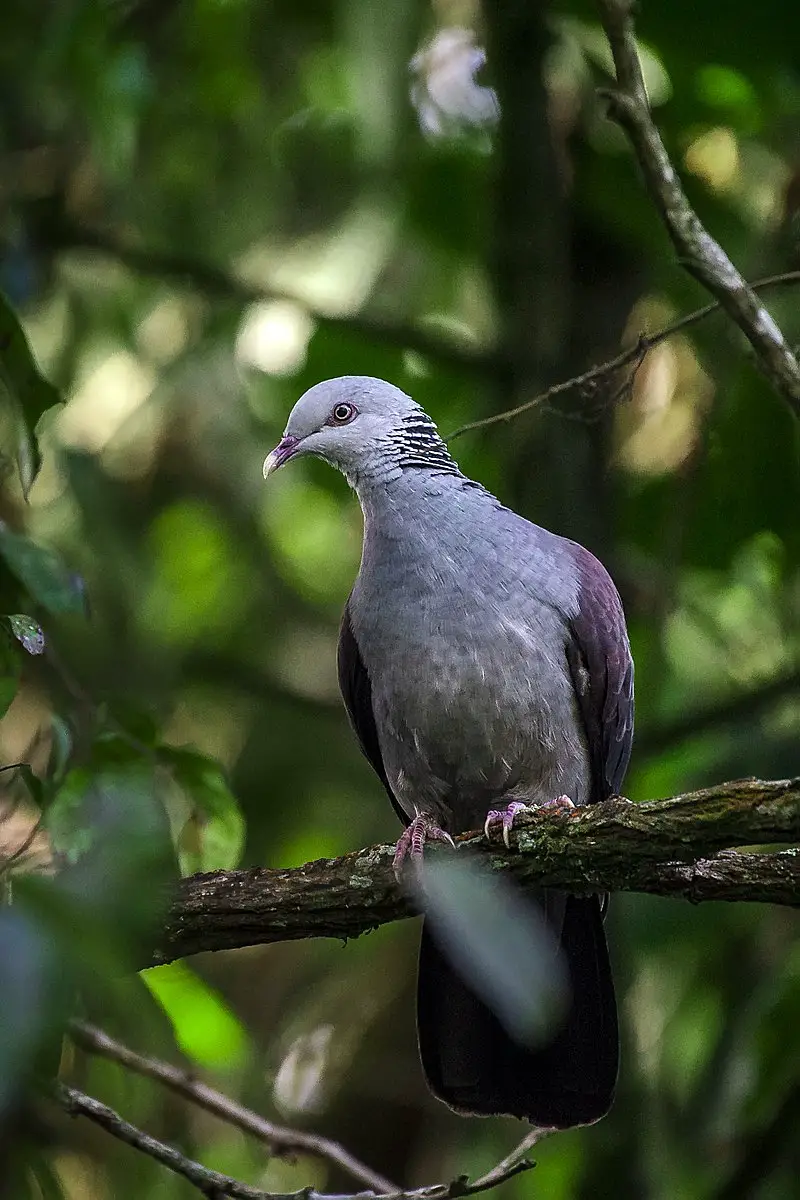
The Nilgiri wood pigeon is a bird that is found in the moistness of the Western Ghats in southwestern India. Mainly feeding on fruits, it can be seen foraging in the canopy of dense hill forests.
It can be easily identified in the field by its size, dark colors and the unique checkerboard pattern on its nape. This bird possesses a dark grey and black plumage that makes it quite distinctive.
Scientific classification:
| Kingdom | Animalia |
| Phylum | Chordata |
| Class | Aves |
| Order | Columbiformes |
| Family | Columbidae |
| Genus | Columba |
| Species | C. elphinstonii |
Also Featured In: Common Birds of Maharashtra,
31. Purple-Rumped Sunbird
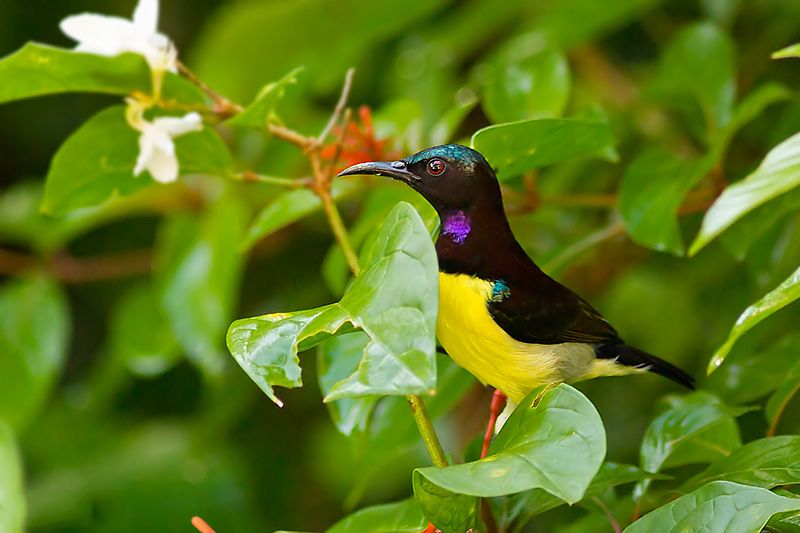
The Purple-rumped sunbird is a tiny bird found exclusively in the Indian Subcontinent. They primarily consume nectar but also have insects as a part of their diet when feeding young ones.
These birds can hover for a brief period, but they usually settle on a branch or flower to drink nectar. In addition, they create hanging pouch nests using cobwebs, lichens, and plant materials.
The males have a unique purple patch on their rump, making it easy to distinguish them from the female. These tiny birds are a delight to observe and a crucial part of the ecosystem.
Scientific classification:
| Kingdom | Animalia |
| Phylum | Chordata |
| Class | Aves |
| Order | Passeriformes |
| Family | Nectariniidae |
| Genus | Leptocoma |
| Species | L. zeylonica |
32. Loten’s Sunbird
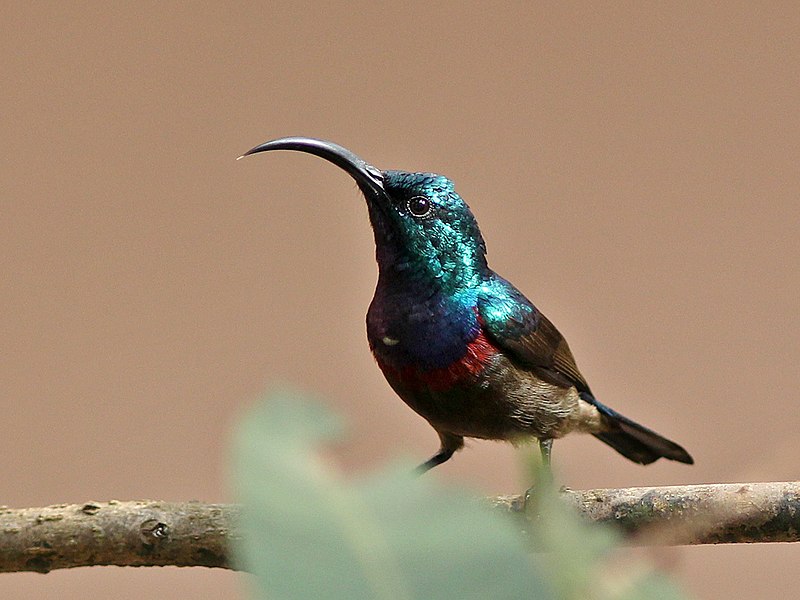
Loten’s sunbird, also known as the long-billed sunbird or maroon-breasted sunbird, is a species of sunbird found in India and Sri Lanka. It is closely related to the purple sunbird and both species hover around flowers for nectar.
However, Loten’s sunbird can be distinguished by its longer bill. It is named after Joan Gideon Loten, the Dutch governor of colonial Ceylon.
This bird is endemic to the region and is known for its vibrant colors, including a maroon breast and iridescent green feathers.
The Loten’s sunbird is an important pollinator in its ecosystem, helping to spread pollen from flower to flower as it feeds on nectar.
Its presence is a testament to the unique biodiversity of the region, and efforts are being made to conserve this beautiful bird species.
Scientific classification:
| Kingdom | Animalia |
| Phylum | Chordata |
| Class | Aves |
| Order | Passeriformes |
| Family | Nectariniidae |
| Genus | Cinnyris |
| Species | C. lotenius |
Also Featured In: Common Birds in Bangalore, Birds of Andhra Pradesh
33. Lord Derby’s Parakeet
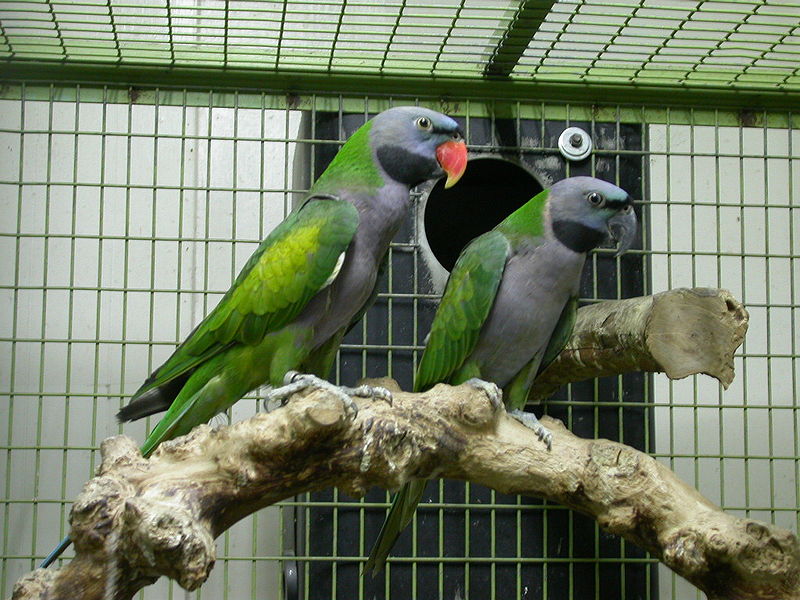
Lord Derby’s parakeet is a beautiful parrot species found in the Indian states of Arunachal Pradesh and Assam, as well as parts of Tibet, Sichuan, and Yunnan in China.
This bird thrives in small pockets of moist evergreen forests, but unfortunately faces threats such as the cutting of old trees (which are important for nesting) and poaching for their feathers.
Despite these challenges, Lord Derby’s parakeet is a striking bird to behold, with vibrant green plumage and a distinctive red beak.
Conservation efforts are necessary to protect this species and preserve its unique beauty for generations to come.
Scientific classification:
| Kingdom | Animalia |
| Phylum | Chordata |
| Class | Aves |
| Order | Psittaciformes |
| Family | Psittaculidae |
| Genus | Psittacula |
| Species | P. derbiana |
34. Indian Scops Owl
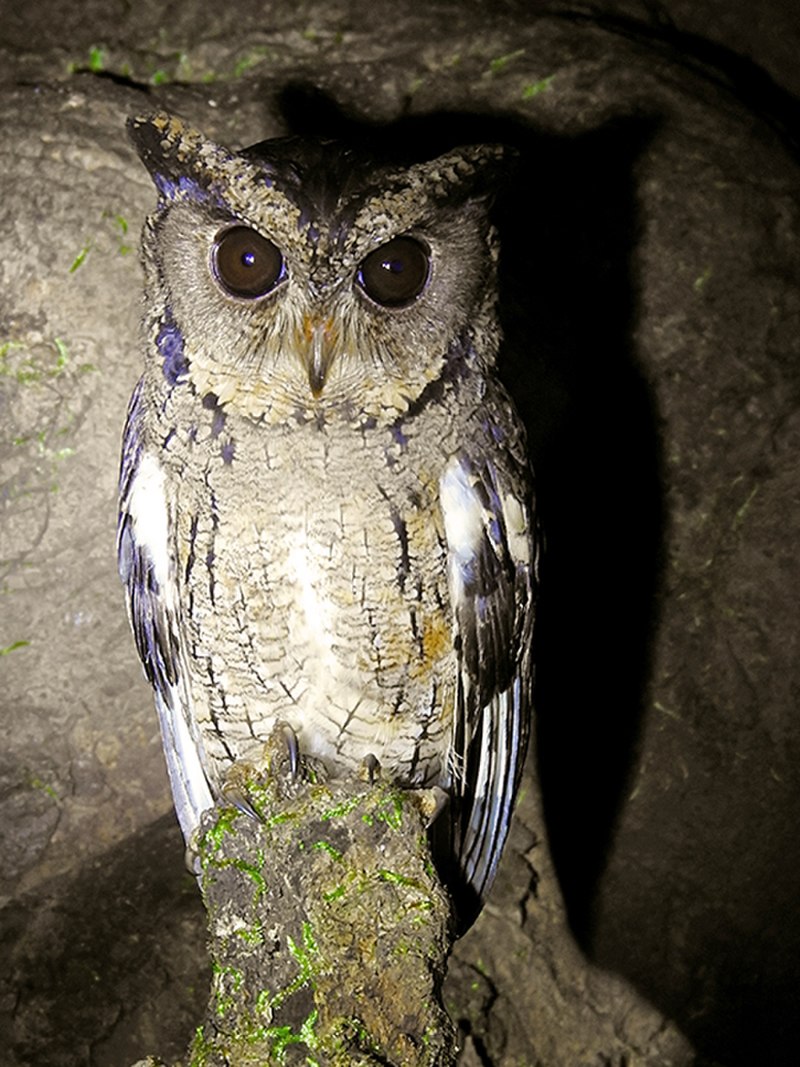
The Indian scops owl is a nocturnal bird species found in South Asia. It is small in size, typically measuring around 23-25 cm. This owl was earlier considered to be the same species as the collared scops owl.
The name of the bird is derived from Sinhalese, and it refers to the brown fish owl and white barn owl present in the region.
The Indian scops owl is skilled in hunting at night and preys on insects, rodents, and small birds.
It has a distinct facial disc that helps in amplifying sound and locating prey. Due to habitat loss and deforestation, the population of the Indian scops owl has suffered a decline in recent years.
It is important to conserve these birds for their role in maintaining the ecological balance.
Scientific classification:
| Kingdom | Animalia |
| Phylum | Chordata |
| Class | Aves |
| Order | Strigiformes |
| Family | Strigidae |
| Genus | Otus |
| Species | O. bakkamoena |
35. Bronzed Drongo
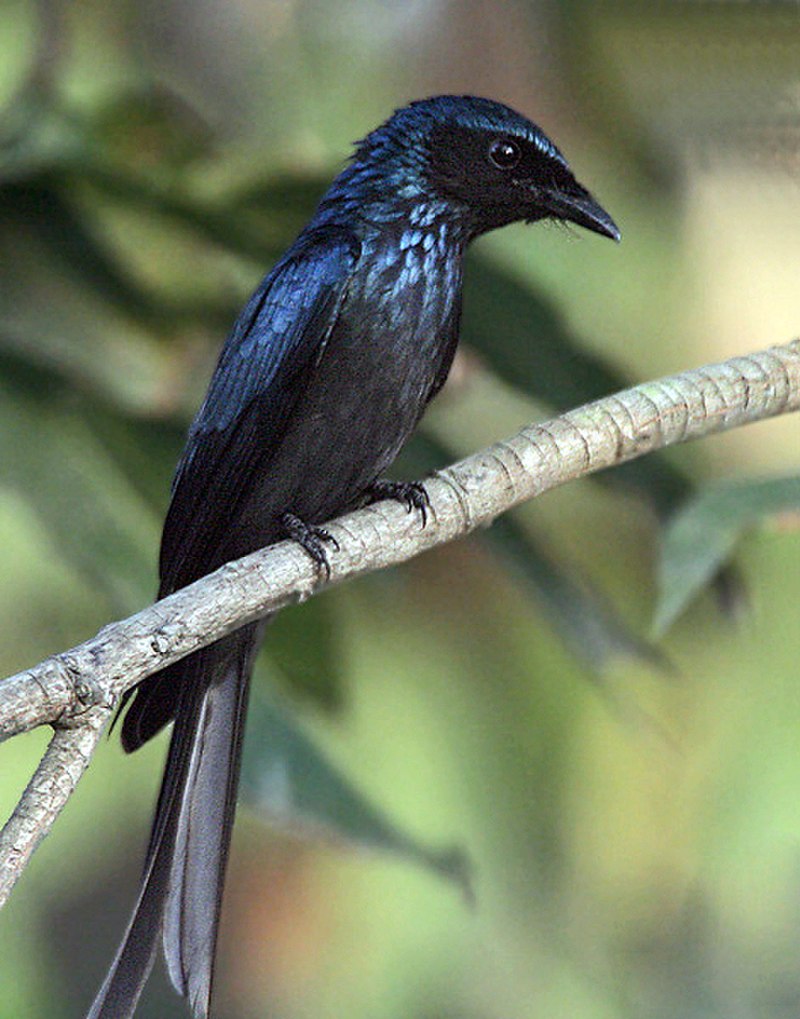
Bronzed drongo is a diminutive bird belonging to the drongo group that is native to the Indian Subcontinent and Southeast Asia. It is typically found in the forested areas and is known to capture insects in flight by making aerial sallies.
Despite being similar to its counterparts in the region, the bronzed drongo is relatively smaller and has distinct physical features. It is a gorgeous bird with a shiny bronze plumage that gleams in the sunlight.
The bronzed drongo is a master of deception and has been reportedly responsible for stealing food from other birds by mimicking their alarm calls.
It is an agile and swift bird that can maneuver through the dense forests with ease. While it may appear dainty and delicate, the bronzed drongo is a formidable hunter that plays an essential role in the ecosystem.
Scientific classification:
| Kingdom | Animalia |
| Phylum | Chordata |
| Class | Aves |
| Order | Passeriformes |
| Family | Dicruridae |
| Genus | Dicrurus |
| Species | D. aeneus |
36. Rose-Ringed Parakeets
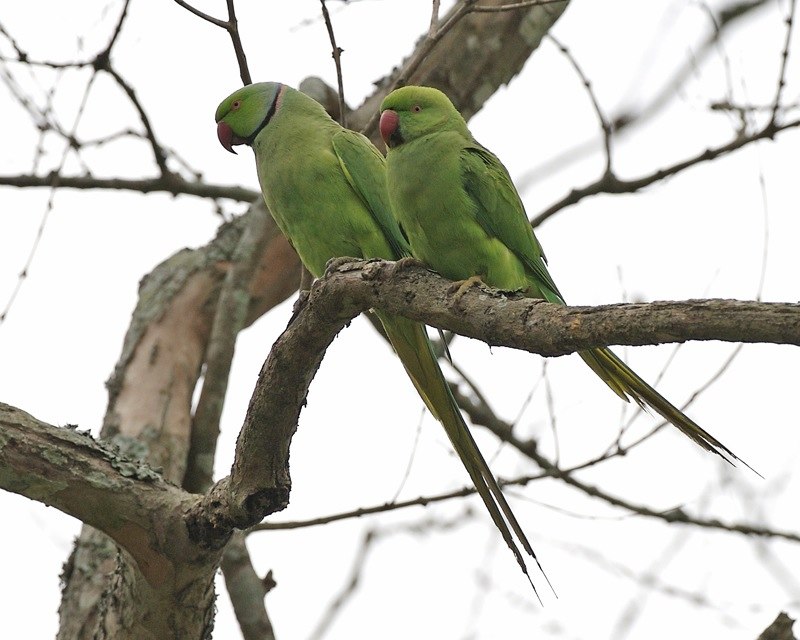
The Rose-ringed Parakeet, a member of the Psittacula genus, is a popular bird in aviculture. These parrots are commonly known as Afro-Asian ring-necked parrots due to their origins in Africa and South-East Asia.
They are a widespread group, with most species concentrated in South Asia but also found in Africa and the Indian Ocean islands.
Interestingly, Psittacula is the only genus of Parrot with the majority of its species found in continental Asia.
Rose-ringed Parakeets are known for their distinctive green plumage and a bright ring around their neck.
They are intelligent and social birds, with the ability to mimic human speech. In their natural habitat, they live in flocks and are often found in agricultural areas.
Due to their popularity as pets, some populations of Rose-ringed Parakeets have been introduced to non-native regions, causing concerns for the local ecosystems.
Scientific classification:
| Kingdom | Animalia |
| Phylum | Chordata |
| Class | Aves |
| Order | Psittaciformes |
| Family | Psittaculidae |
| Tribe | Psittaculini |
| Genus | Psittacula Cuvier, 1800 |
37. Blossom-Headed Parakeet
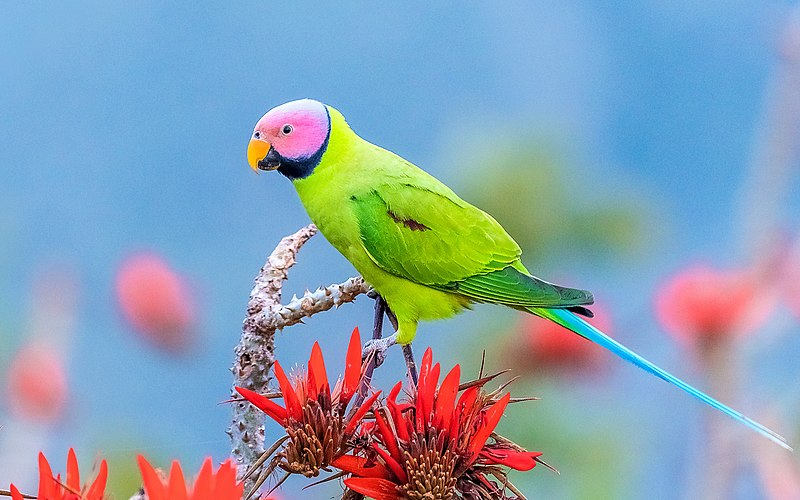
The Blossom-headed parakeet is a bird that belongs to the Psittaculidae family. It can be found in a variety of areas including Eastern Bangladesh, Bhutan, Northeast India, Nepal, and Southeast Asia.
This bird is known for living in lowland and foothill open forests. There are two subspecies of the Blossom-headed parakeet. This species is a resident breeder in the areas it inhabits.
Scientific classification:
| Kingdom | Animalia |
| Phylum | Chordata |
| Class | Aves |
| Order | Psittaciformes |
| Family | Psittaculidae |
| Genus | Psittacula |
| Species | P. roseata |
38. Common Hill Myna
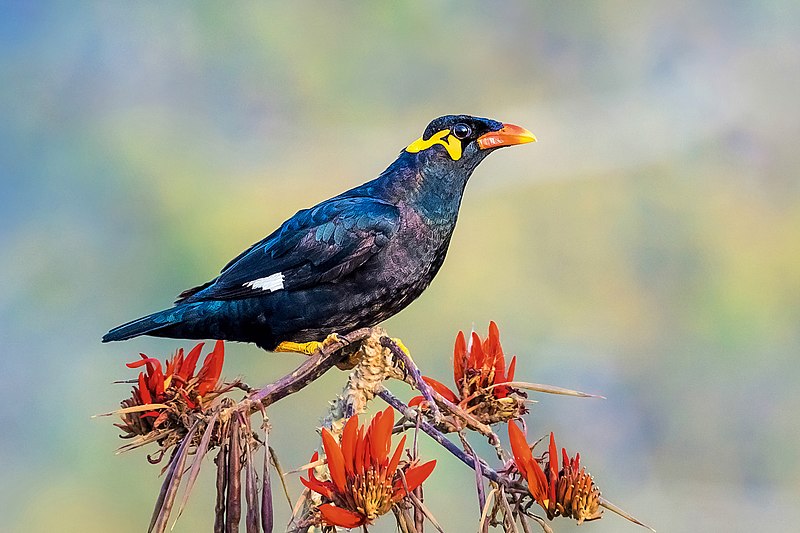
The Common hill myna bird, also known as the mynah, is a popular sight in aviculture. It is part of the starling family and can be found in South and Southeast Asia.
In Sri Lanka, it was once considered a subspecies of the bird. The Common hill myna has distinct black plumage with a bright yellow beak and eye patches. It is known for its exceptional ability to mimic human speech and other sounds.
Due to its unique characteristics, the bird is highly sought after by aviculturists and kept as a pet.
However, excessive capture for this purpose has led to the decline in the wild population of the Common hill myna, making it a vulnerable species.
Scientific classification:
| Kingdom | Animalia |
| Phylum | Chordata |
| Class | Aves |
| Order | Passeriformes |
| Family | Sturnidae |
| Genus | Gracula |
| Species | G. religiosa |